Notice: Refer to Fastener Notice in the Preface section.
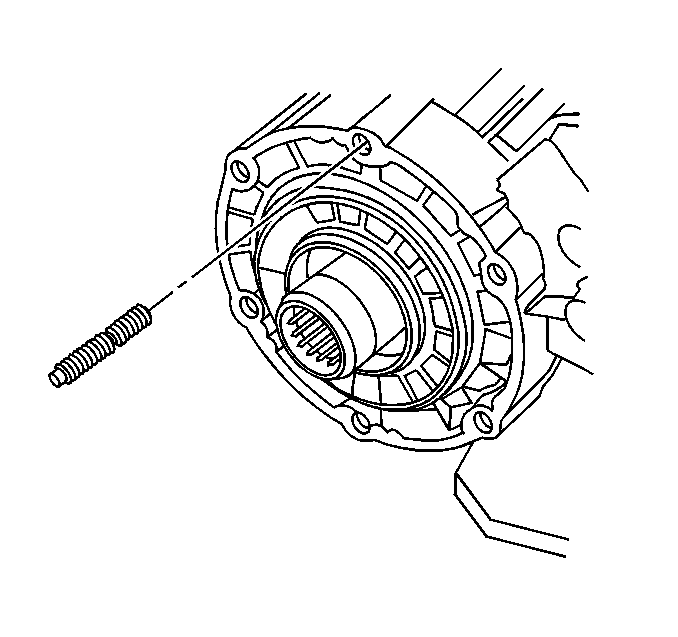
Important: When installing the new retaining rings in any of the following service procedures, ensure that the retaining rings are properly seated before proceeding to the next service procedure. Always use NEW retaining rings.
- If removed, install the transfer case mounting studs to the height of 29.5 mm-30.5 mm (1.16-1.20 in).
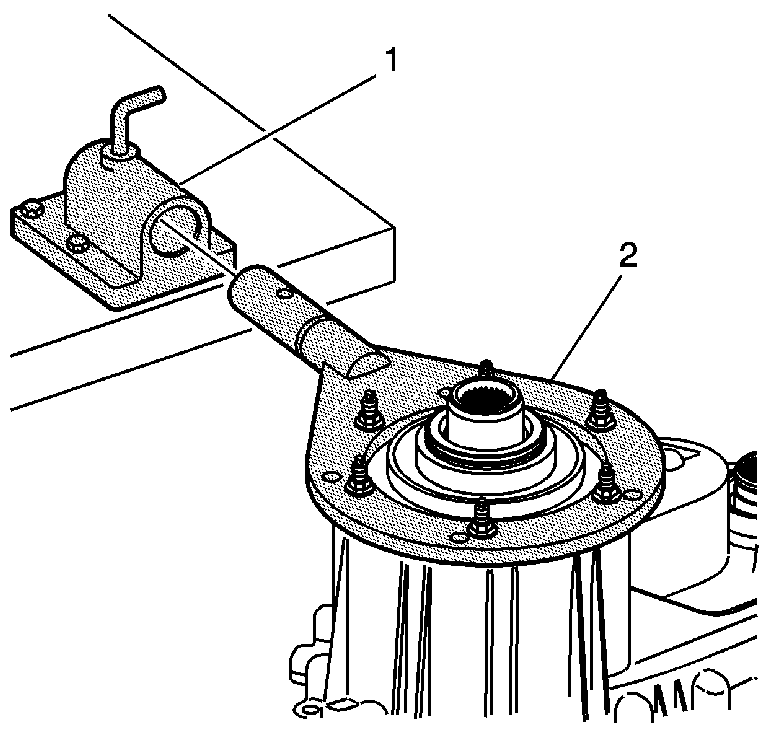
- Attach the
J 45759
to the front transfer case using the adapter studs. All of the assembly procedures can be performed with the case mounted to the
J 45759
.
- Install the
J 45759
(2) into the
J 3289-20
(1) and secure with the pivot pin.
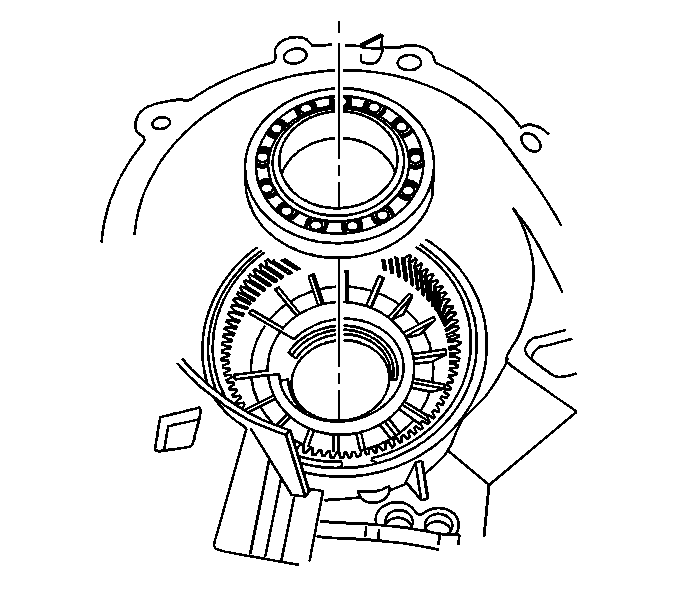
Important: Use only new retaining rings.
- Install the input bearing. The cage side of the bearing faces to the case front.
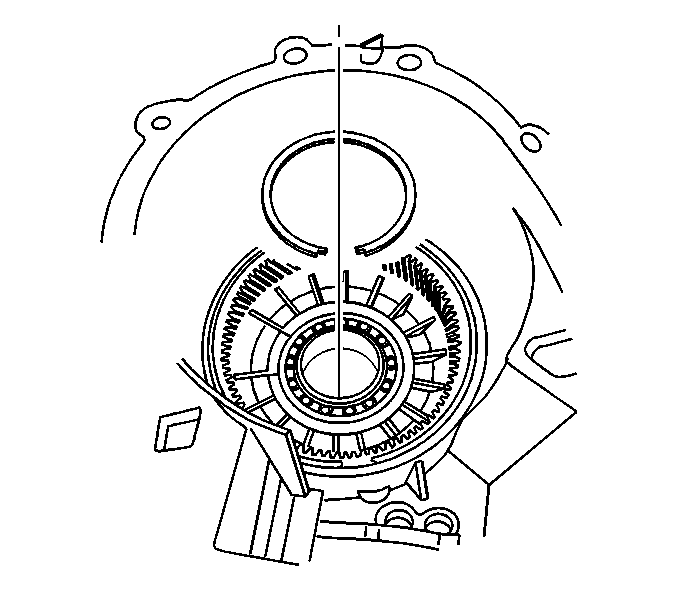
- Install the input bearing retaining ring.
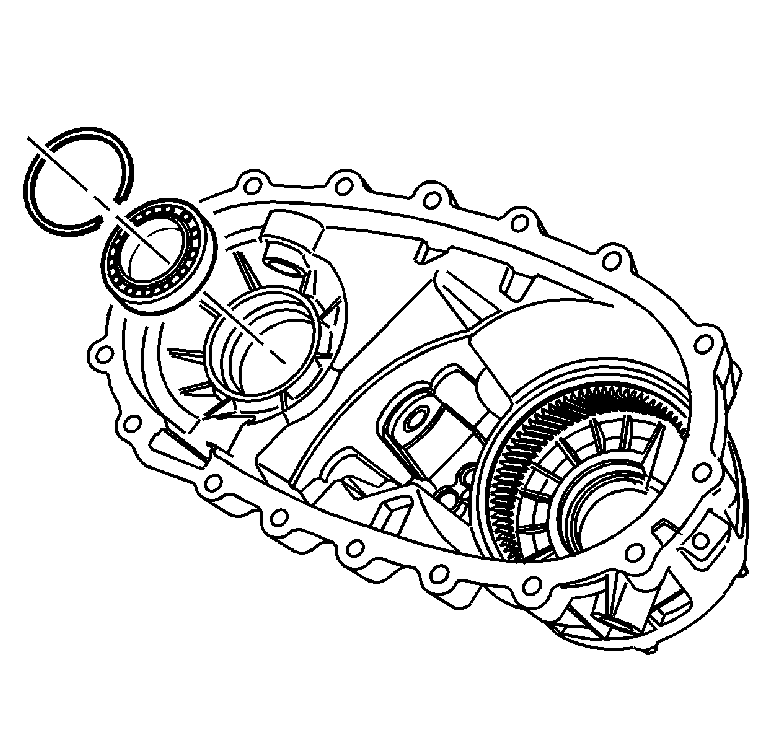
- Install the front output shaft front bearing. The cage side of the bearing faces to the front of the case.
- Install the front output shaft front bearing retaining ring.
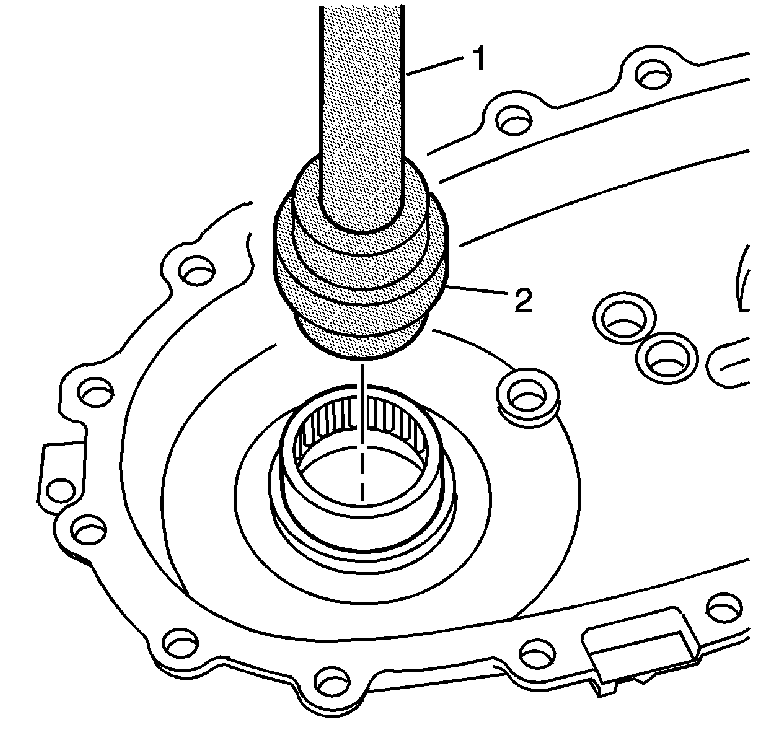
- Using the
J 8092
(1) and the
J 36370
(2), install the front output shaft rear bearing.
| • | The lettering on the bearing faces toward the tool. |
| • | Use the double shoulder side of the
J 36370
to install the bearing recessed in the bore. |
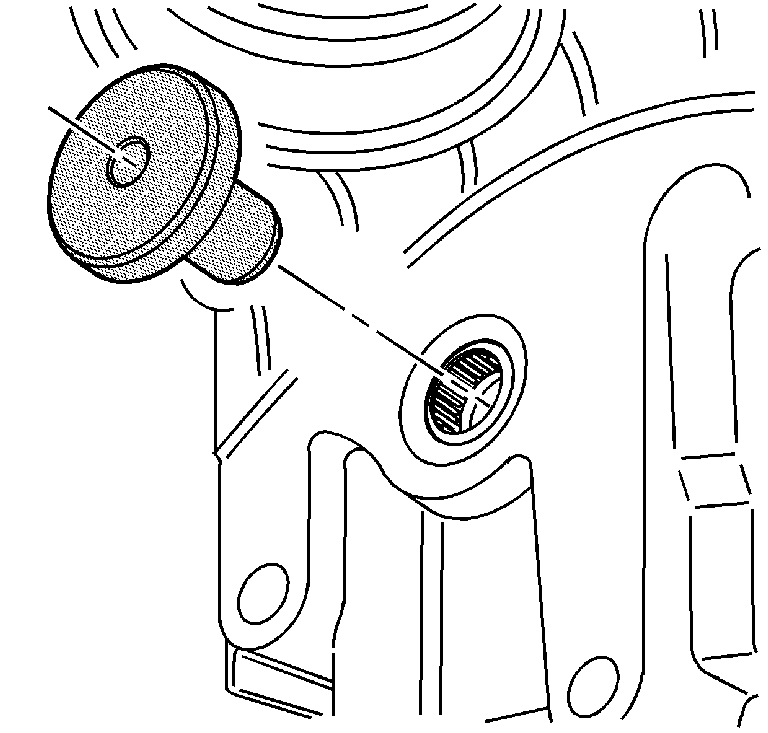
- Using the
J 42737
, install the control actuator lever
shaft bearing. The seal on the bearing faces outward.
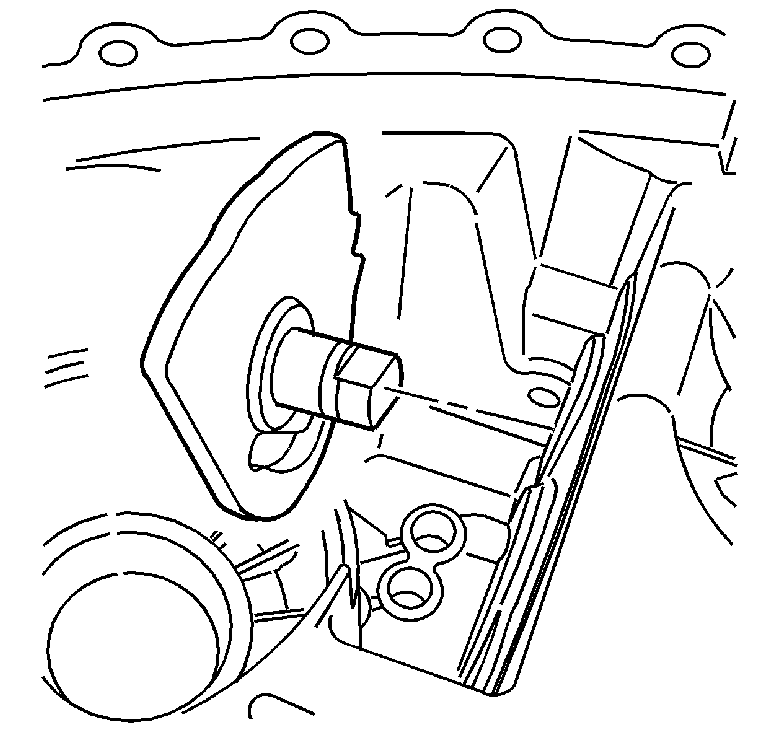
- Using transfer case fluid, lubricate the control actuator lever shaft bearing.
- Install the control actuator lever shaft.
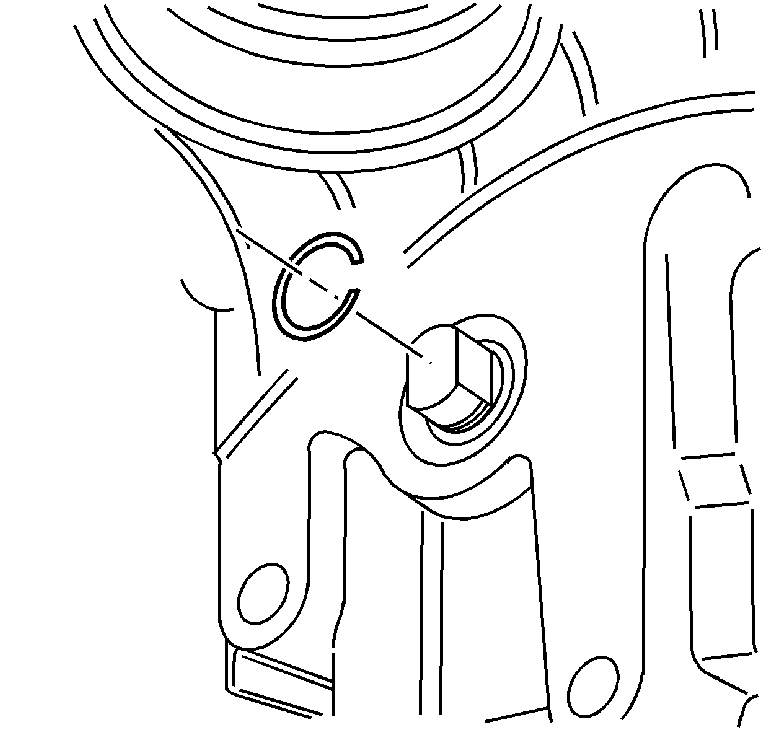
- Install the NEW retaining ring for the control actuator lever shaft. Ensure the retaining ring is fully seated.
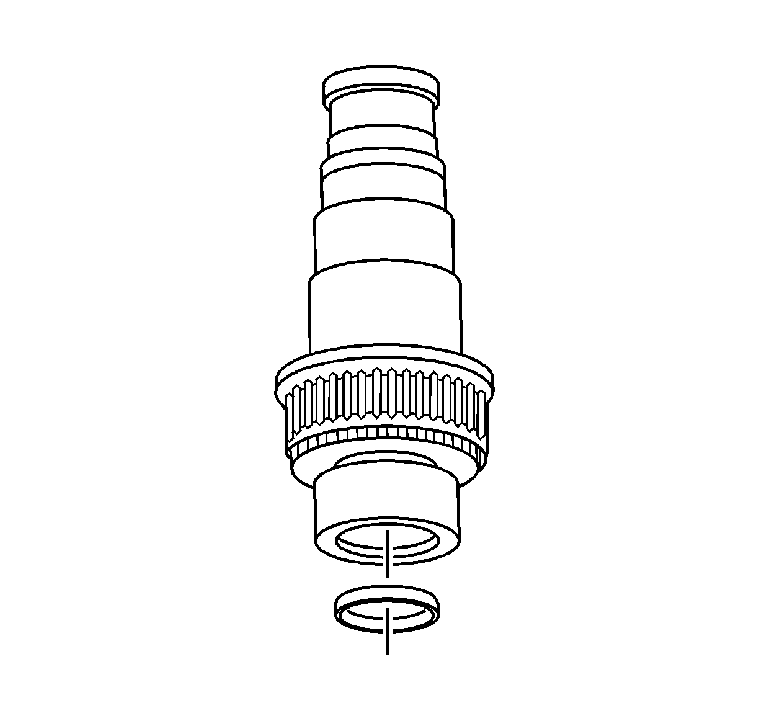
- If it is a new shaft, or if the cup plug was removed, install the cup plug in
the front output shaft using a suitable driver.
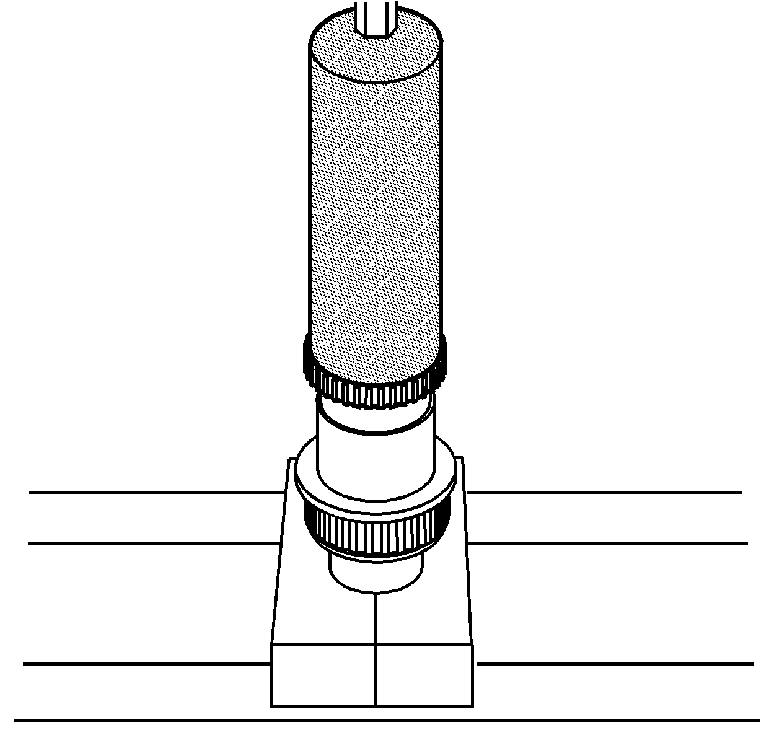
- Using the
J 22873
and a hydraulic press, install a NEW
tone wheel on the front output shaft.
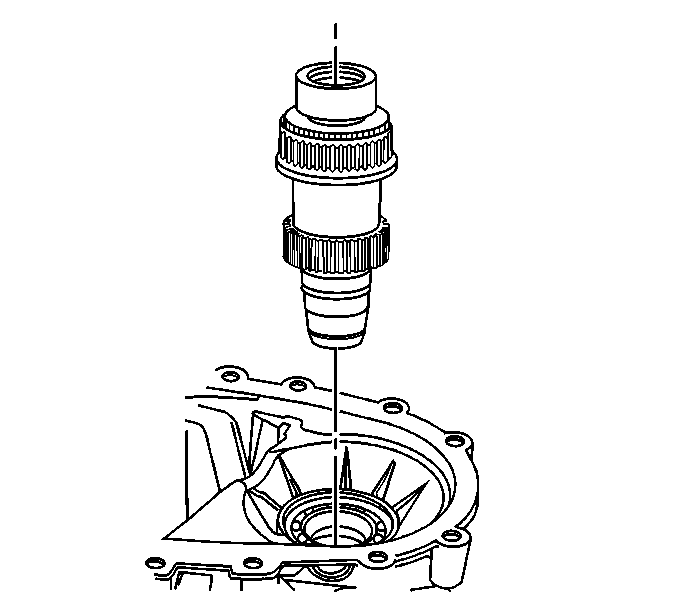
- Install the front output shaft assembly. Use a soft-face hammer to tap the front output shaft into the bearing.
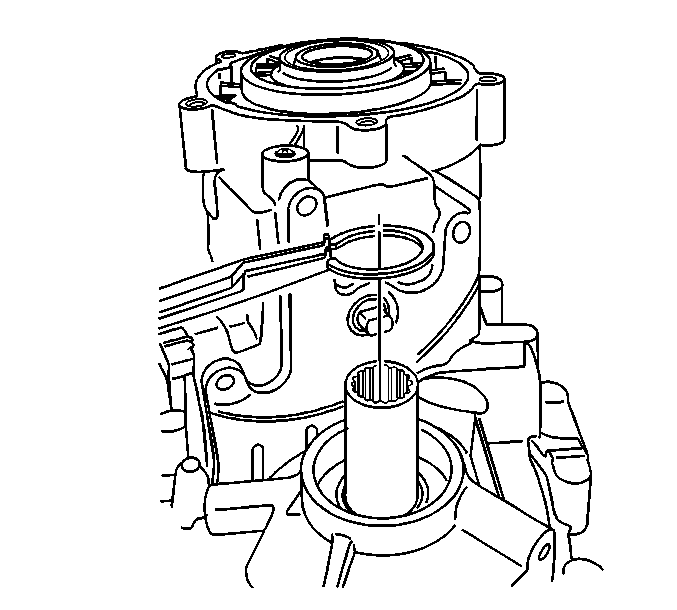
- Install the front output shaft retaining ring.
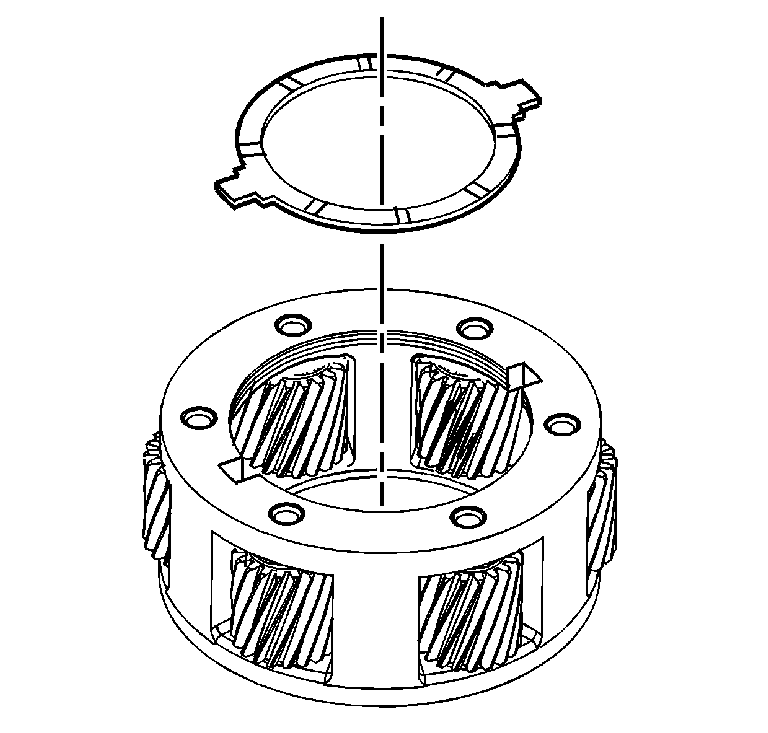
Important: Depending on the version of the transfer case, it may have either a 4 pinion gear or 6 pinion gear planetary carrier assembly. The 4 pinion gear planetary carrier is used with transmission RPO M30
and the input gear splines are 27 teeth. The 6 pinion gear planetary carrier is used with transmission RPO MT1 and MN8 and the input gear splines are 32 teeth. The repair procedures are the same for both planetary carriers.
- Lubricate the thrust washer for the input shaft with
J 36850
or equivalent.
- Install the input shaft thrust washer. Align the tabs on the thrust washer with the slots in the planetary carrier.
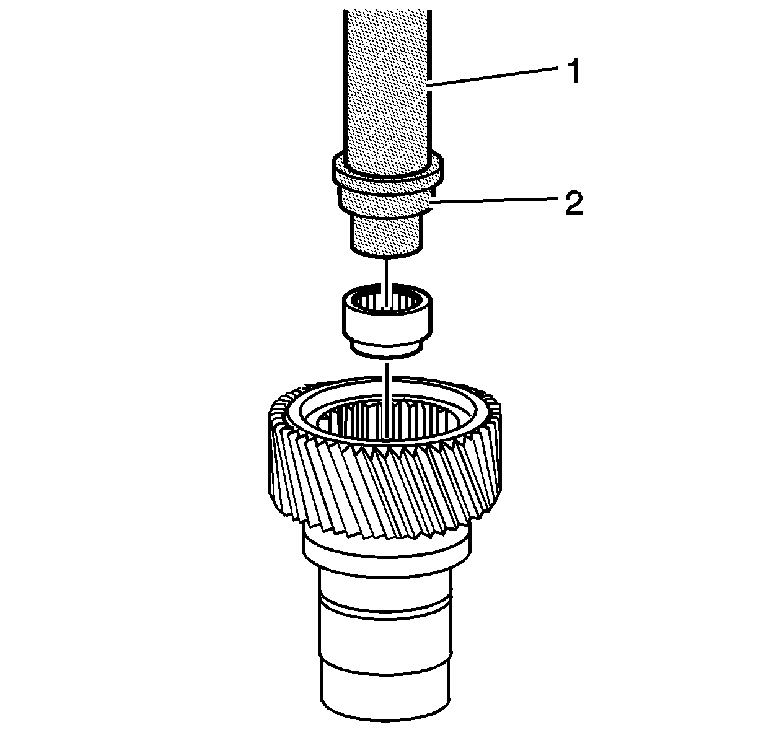
- Using the
J 8092
(1) and the
J 45383
(2), install the pilot bearing in the input shaft.
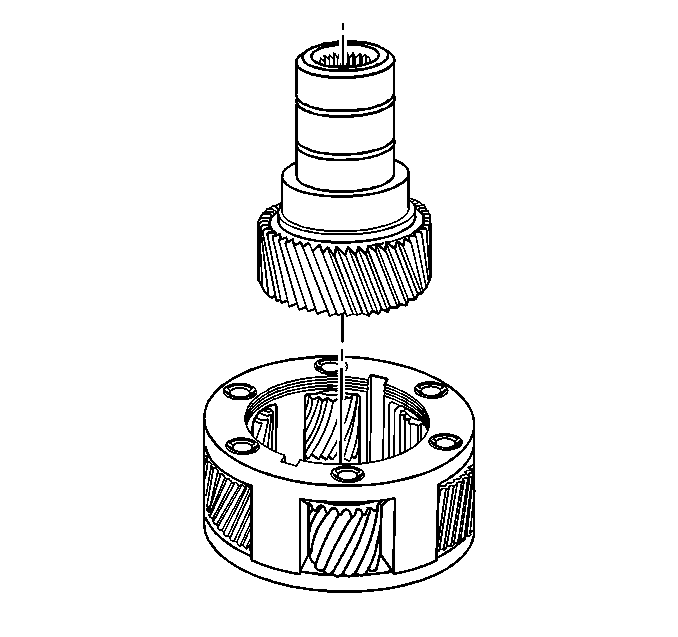
- Install the input shaft assembly.
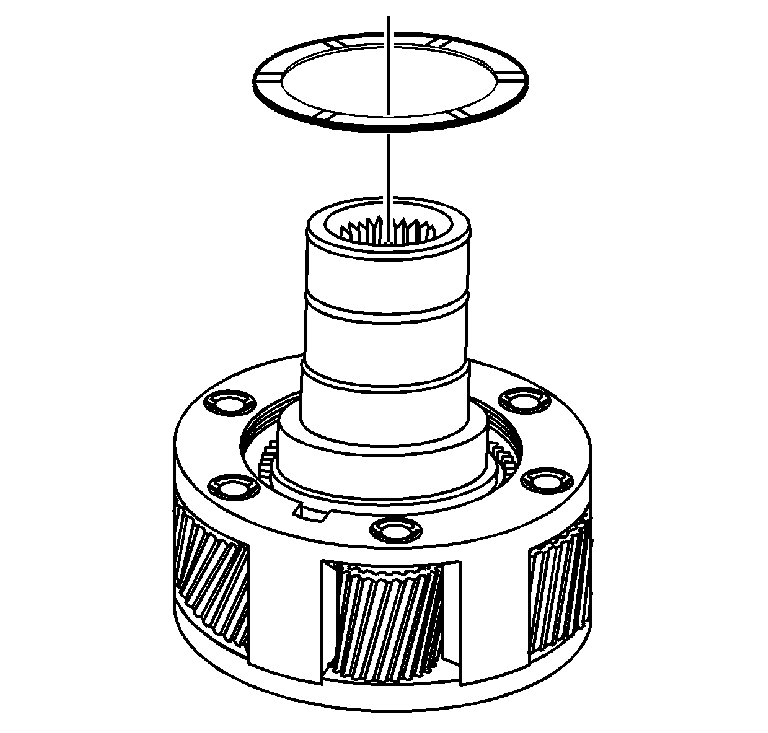
- Lubricate the input shaft thrust washer with
J 36850
or equivalent.
- Install the input shaft thrust washer.
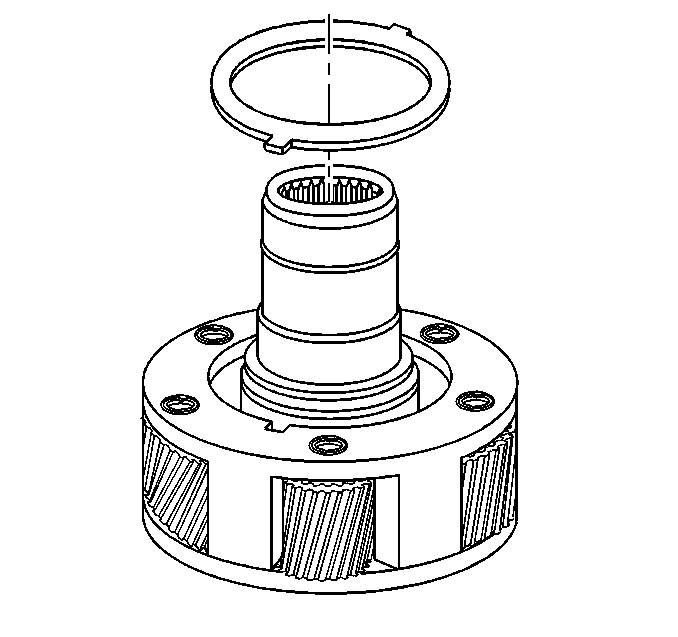
- Lubricate the carrier lock ring with
J 36850
or equivalent.
- Install the carrier lock ring. If there are letters on the lock ring, install with the lettering facing up.
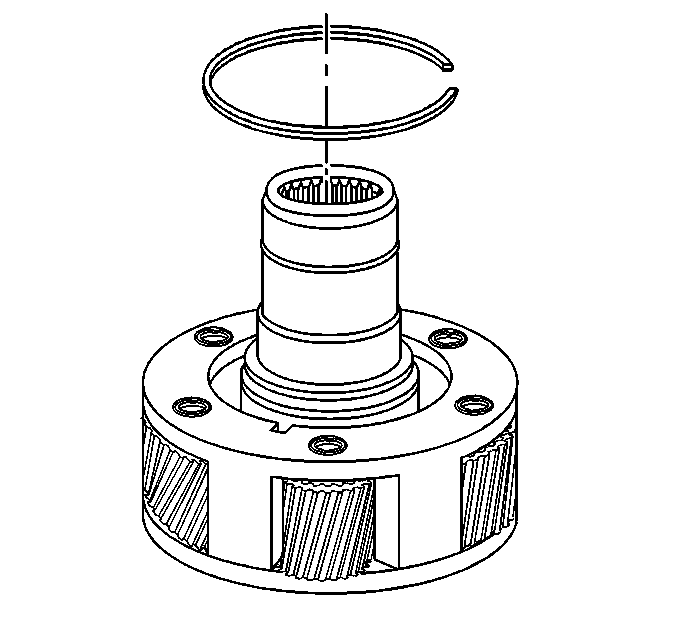
- Install the retaining ring for the planetary gear shaft.
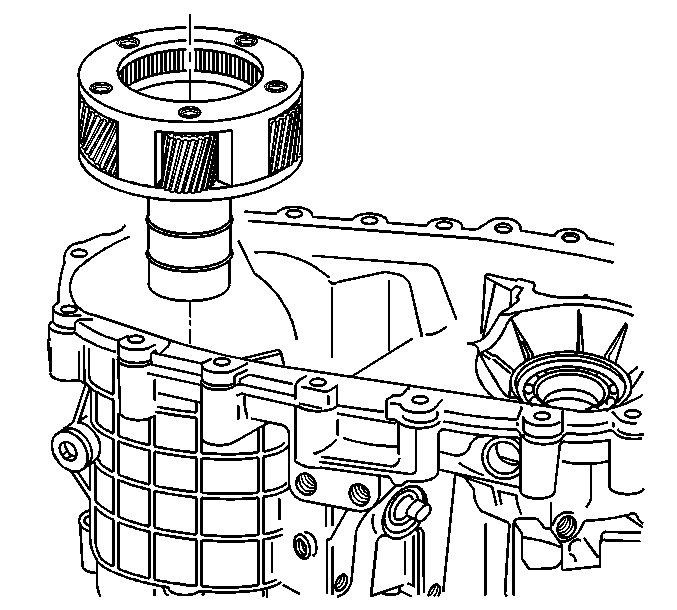
- Install the planetary gear carrier. Use a soft-face hammer to tap the input
shaft into the bearing.
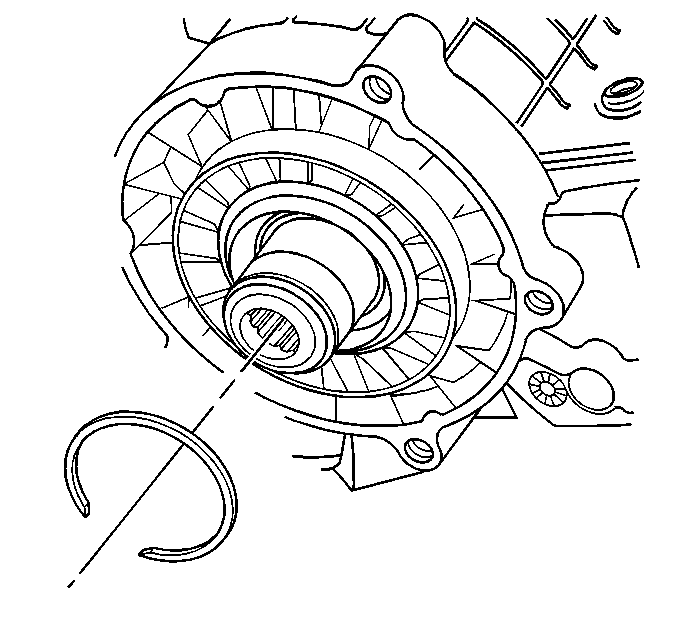
- Install the outer retaining ring for the input gear bearing.
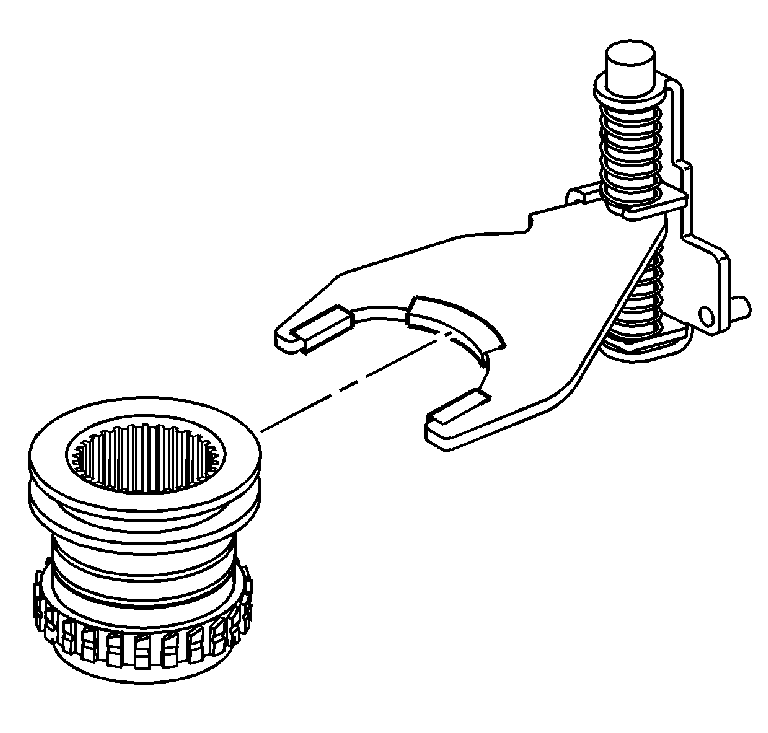
- Install new shift fork pads, if removed.
- Install the range shift sleeve in the range fork.
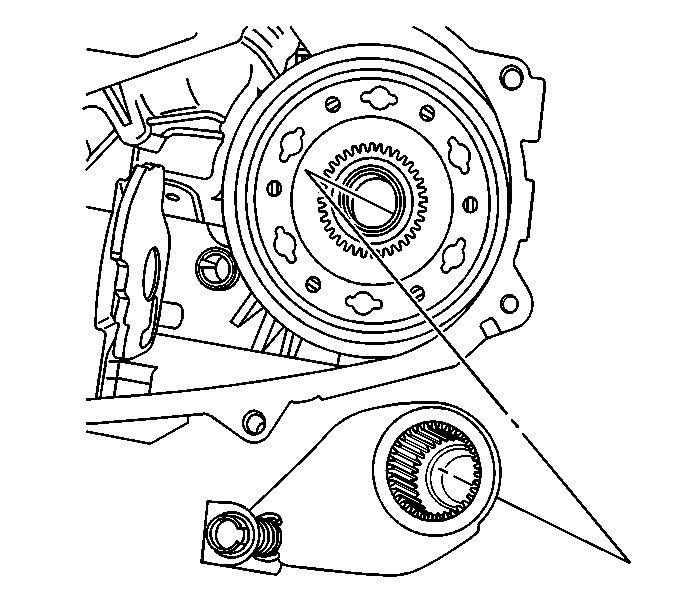
- Align the range shift sleeve on the planetary carrier.
- Align the roller on the range fork in the control actuator lever slot.
- Install the range shift fork.
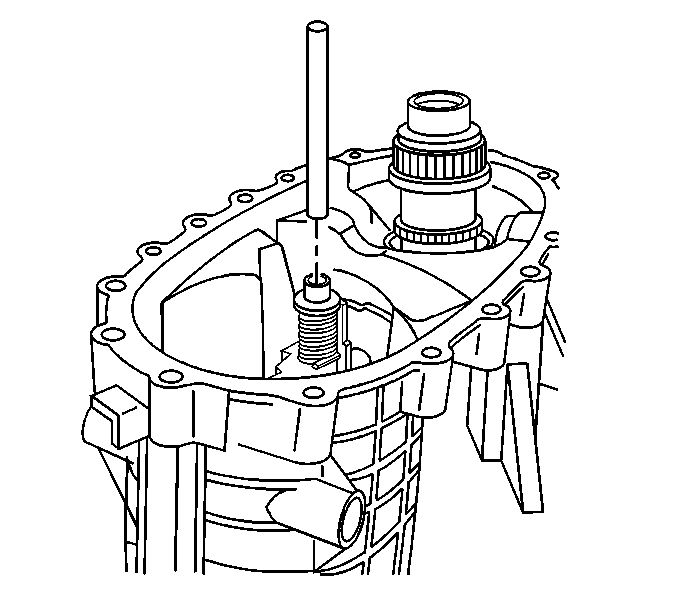
- Install the shift fork shaft.
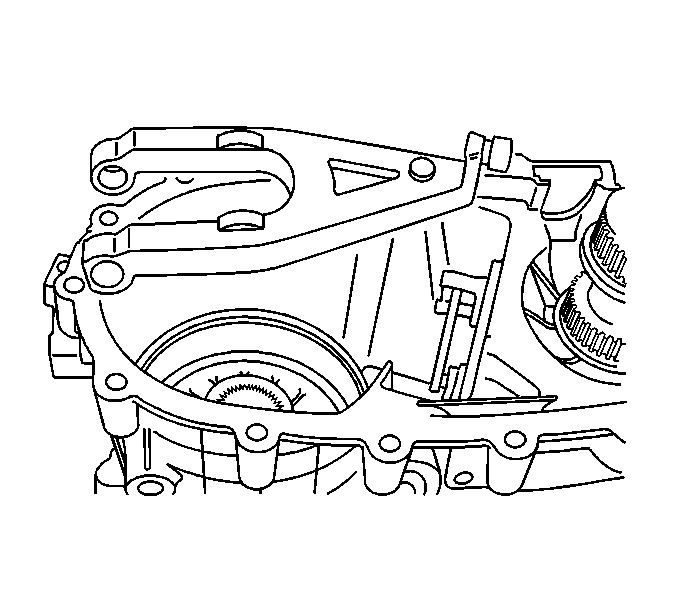
- Install the clutch lever assembly.
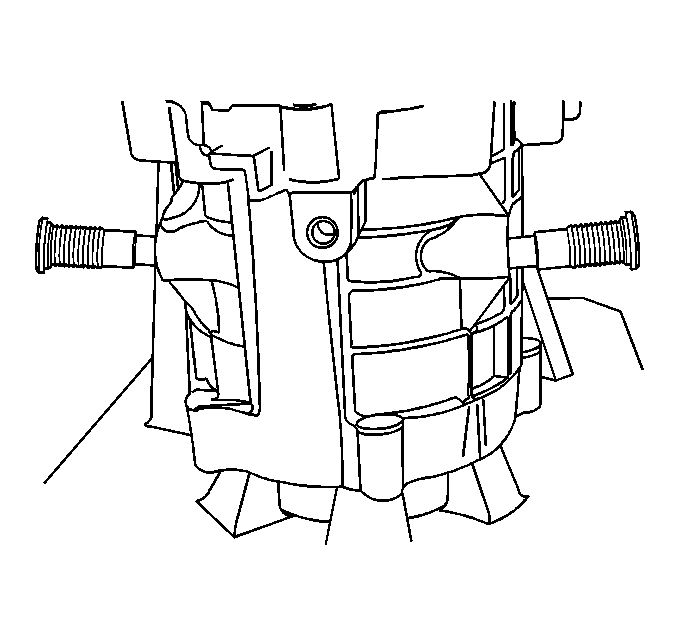
Important: When performing the following service procedure, ensure that the clutch lever pivot pins are tightened evenly. Ensure that the clutch lever moves freely after the pivot pins are tightened and engaging the lever.
- Install new O-ring seals on the clutch lever pivot pins.
- Lubricate the O-ring seals with transfer case fluid.
- Apply threadlock GM P/N 12345493 (Canadian P/N 10953488), or equivalent, to the clutch lever pivot pin threads.
- Install the clutch lever pivot pins with the aluminum washers and O-ring seals in the front case half.
Tighten
Tighten the clutch lever pivot pins to 61 N·m (45 lb ft).
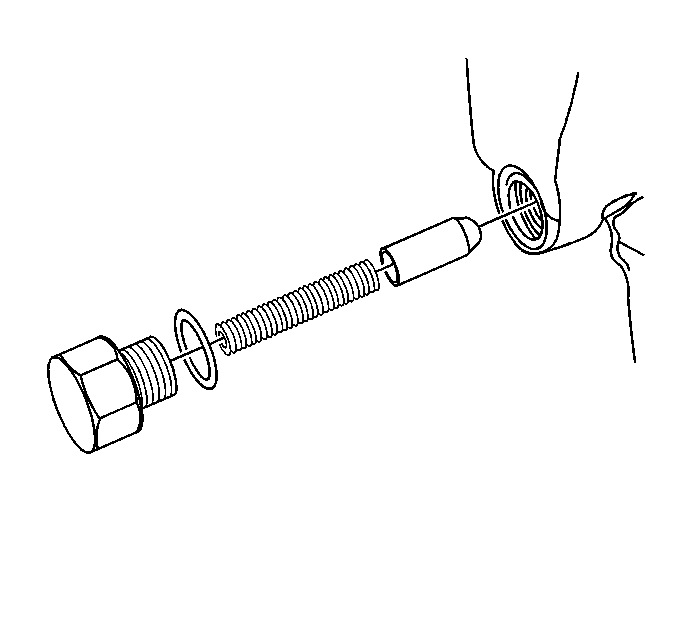
Important: Ensure that the shift detent plunger is seated correctly on the control actuator lever.
- Install the shift detent plunger.
- Install the shift detent spring.
- Lightly lubricate a NEW shift detent plunger O-ring seal with transfer case fluid.
- Install the O-ring seal on the shift detent spring bolt.
- Install the shift detent spring bolt in the front transfer case.
Tighten
Tighten the shift detent spring bolt to 17 N·m (13 lb ft).
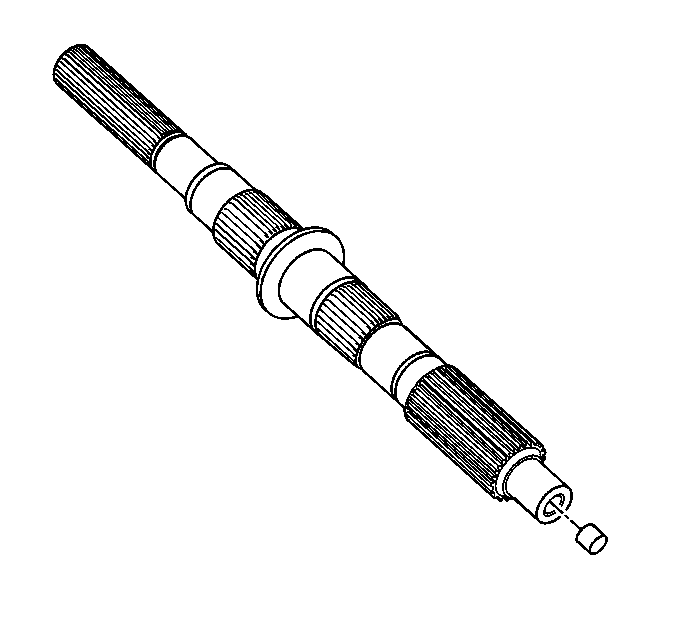
Important: The following service procedure is to be performed only if the rear output shaft is new.
- Install the rear output shaft oil restrictor flush with the end of the shaft.
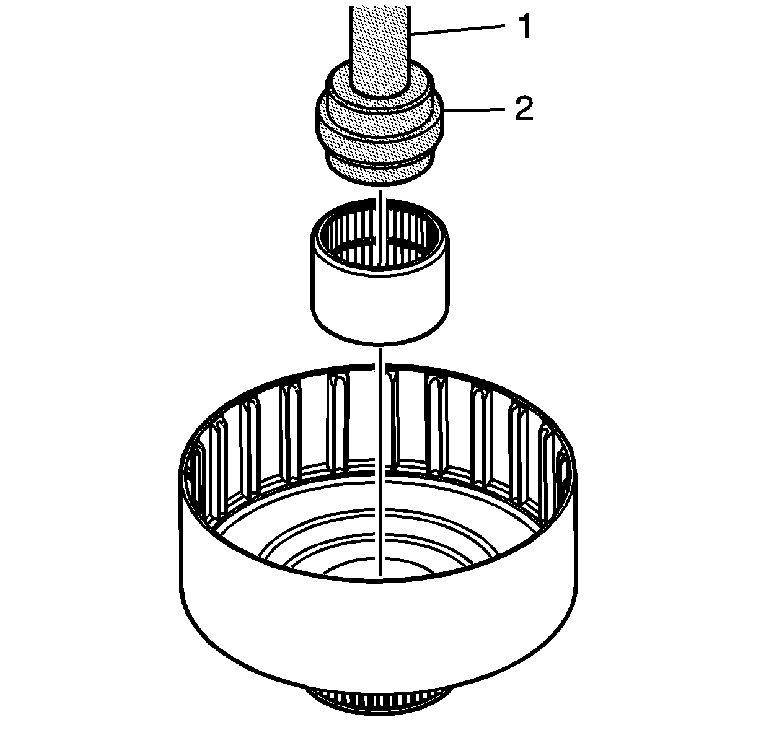
Important: In order to position the bearing at the proper depth, ensure that the double shoulder of the
J 36370
is against the bearing.
- Using the
J 8092
(1) and the
J 36370
(2), install the clutch housing bearing.
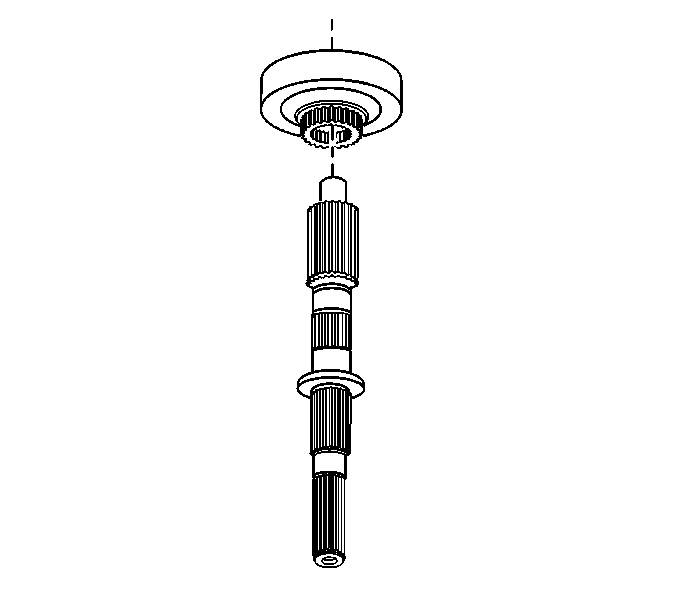
- Clamp the rear output shaft in a soft-jaw vise with the front end facing up.
- Install the clutch housing on the rear output shaft.
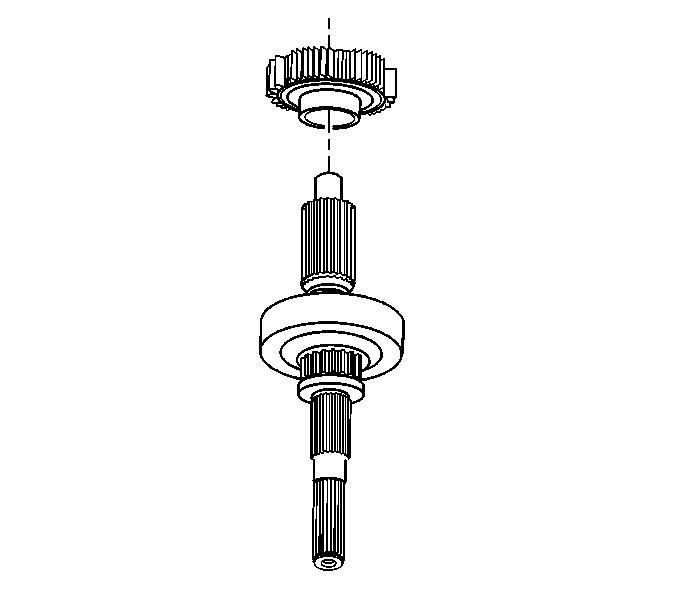
- Install the clutch hub.
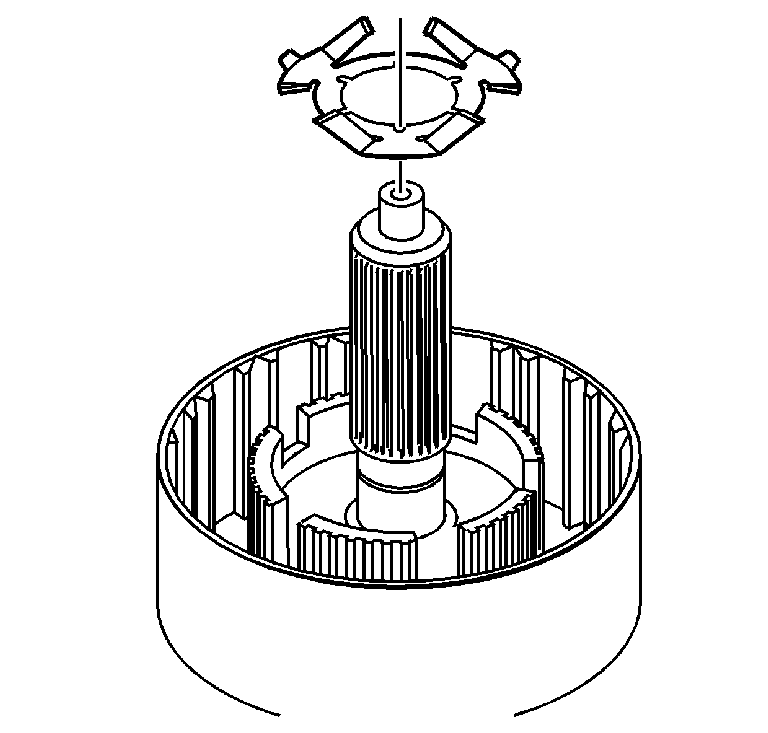
- Install the clutch spring. The fingers of the clutch spring point up when installed.
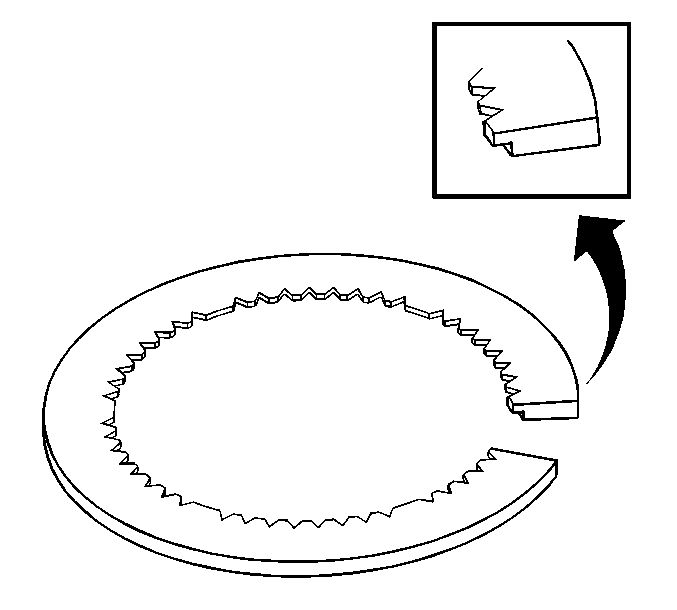
- Install the clutch pressure plate inner in the clutch housing, with the notch in the plate facing down.
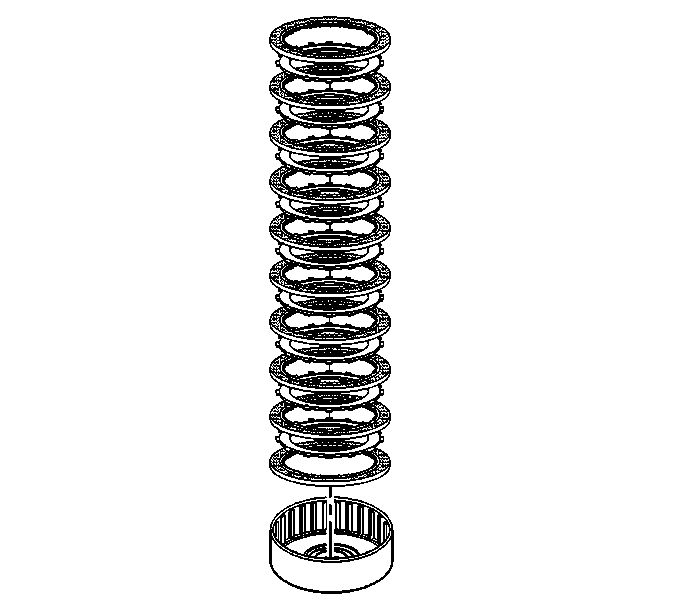
- Install a friction clutch pressure plate.
- Install a steel clutch pressure plate.
- Continue to install the friction and the steel clutch plates, alternating until 10 friction plates and 9 steel plates are installed.
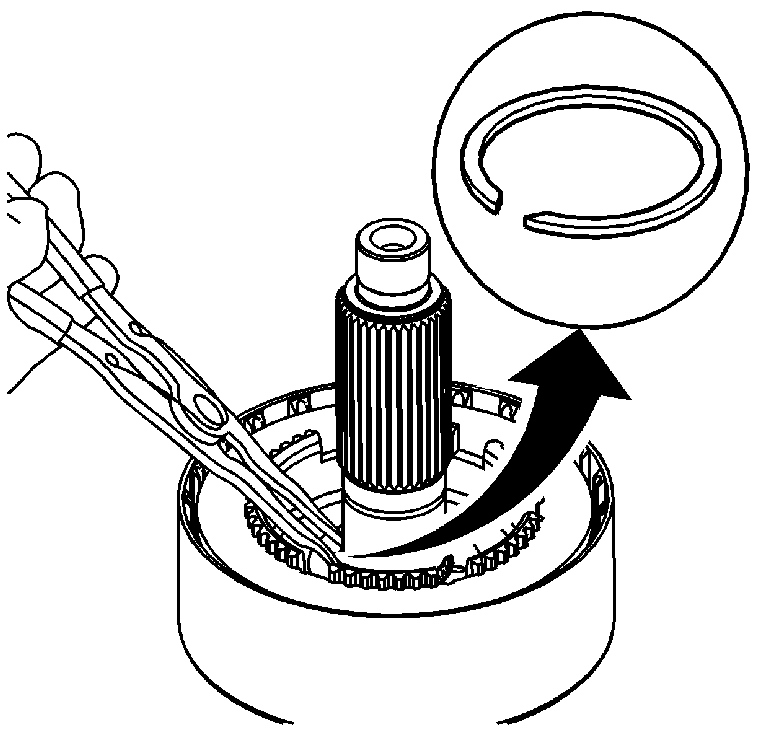
- Install the clutch hub retaining ring.
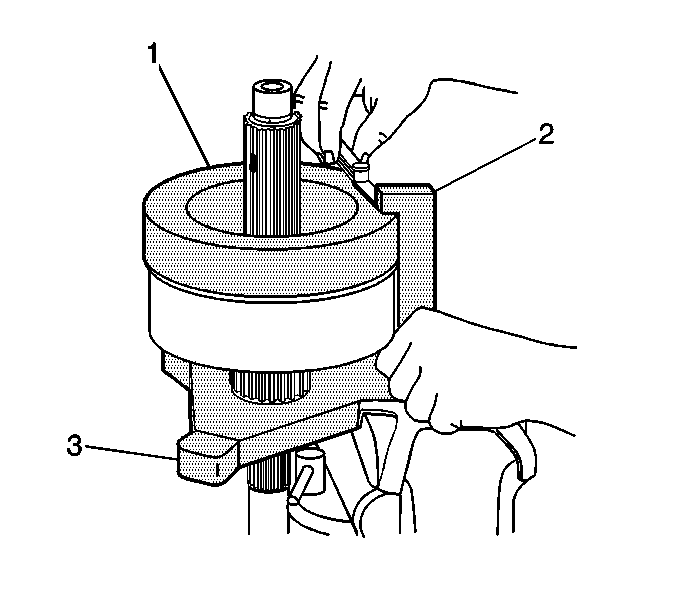
Important: A clutch plate shim package is necessary in order to have the proper shims available for setting the correct clutch pack preload. Improper preload can cause driveability concerns and failure of the transfer case.
- Securely install the base plate (3) of the
J 44295
in a vise with the machined surface of the locating tabs facing up.
- Install the assembled rear output shaft with the clutch housing, the inner clutch plates, and the outer clutch plates on the base plate (3) of the
J 44295
.
- Install the weight (1) of the
J 44295
on top of the assembled clutch plates.
- Place the gage block (2) of the
J 44295
on one of the locating tabs of the base plate (3) of the
J 44295
.
- Using a feeler gage, measure between the gage block (2) and the weight (1) of the
J 44295
.
- Measure with the gage block (2) and the feeler gage on the remaining two locating tabs of the base plate (3).
- The average of the three measurements is the required shim thickness.
Important: Measure the clutch shims in the center area of the shim. The shims may have a burr or ridge around the inner or outer edge causing an incorrect measurement. The available shims may not combine to the desired measurement.
- Select from the clutch plate shim package the correct shim or shims plus or minus 0.10 mm (0.004 in). You may use a combination of two shims to obtain the correct thickness.
The shims in the clutch plate shim package are the following
thickness:
- Remove the weight (1) of the
J 44295
.
Important: After obtaining the desired thickness of shims, do not remove the clutch plates from the clutch housing. If you remove, and then install the clutch plates again, it could change the measurement.
- Install the shim or shims.
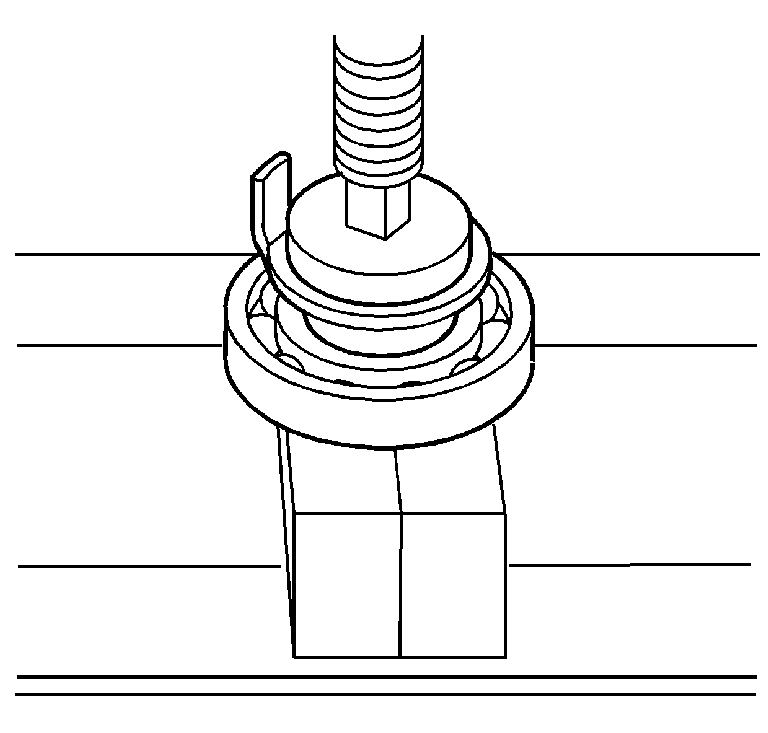
- Using a suitable press plate and a hydraulic press, press the clutch bearing inner
support in the clutch apply plate bearing. Ensure the bearing inner bearing race is supported.
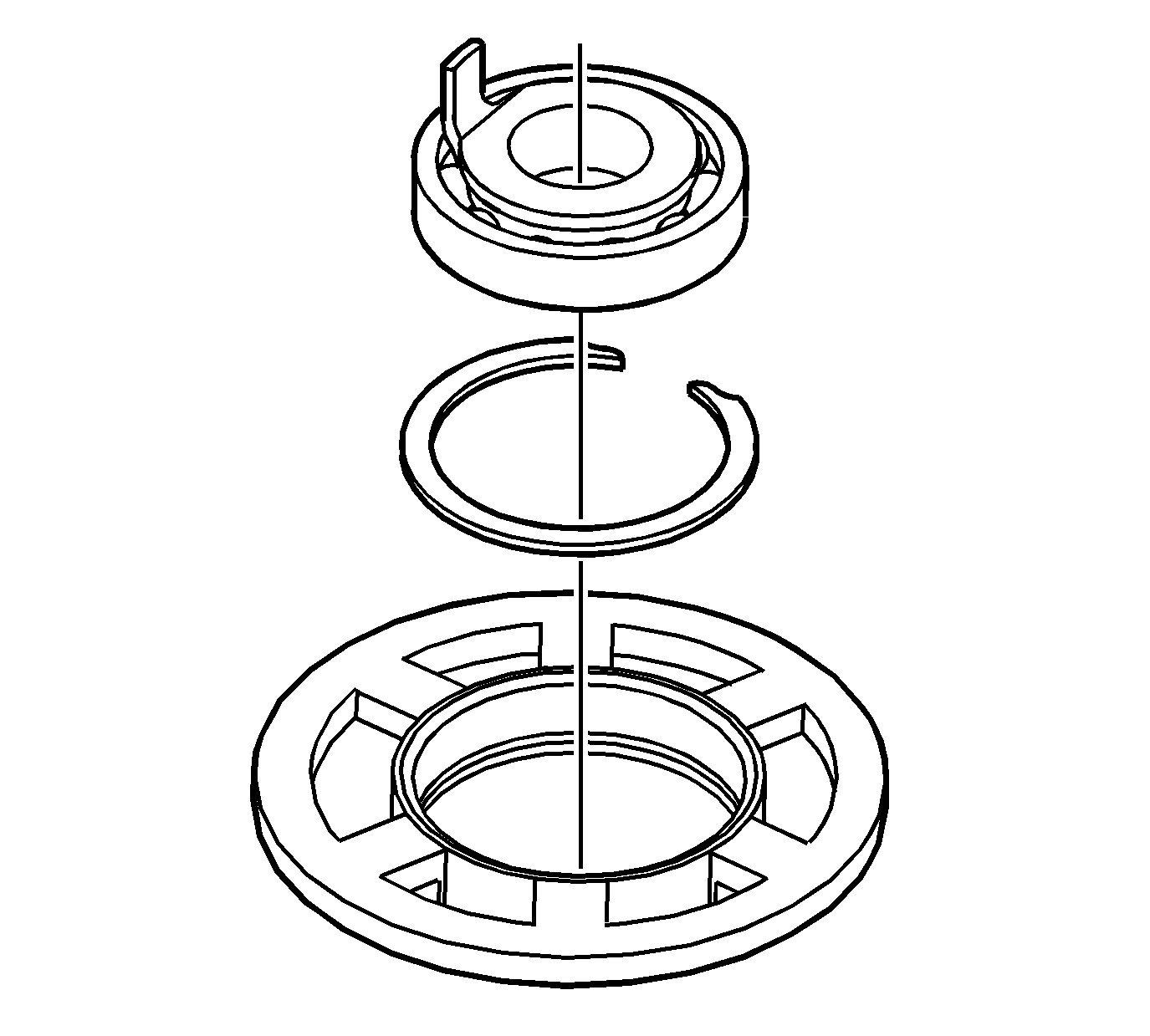
- Install the clutch apply plate bearing and inner support in the clutch apply plate.
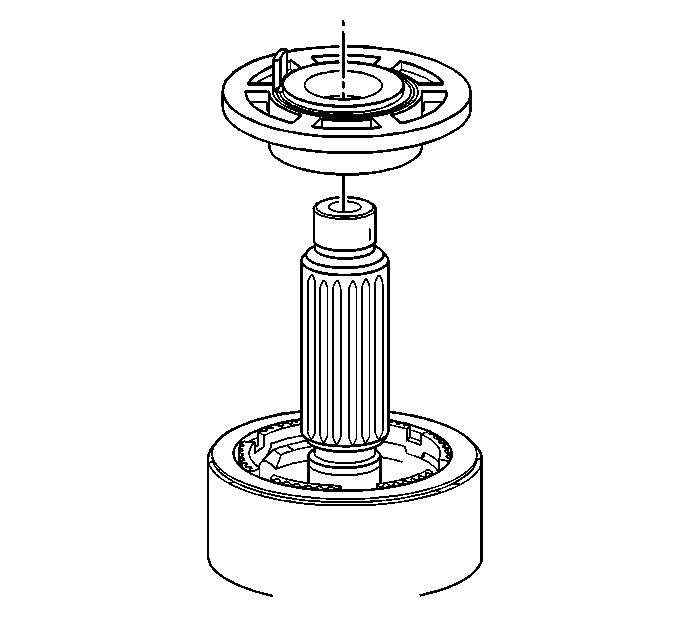
- Install the clutch pressure plate spring.
- Align the tabs on the clutch pressure plate with the grooves in the clutch hub and install the clutch pressure plate assembly.
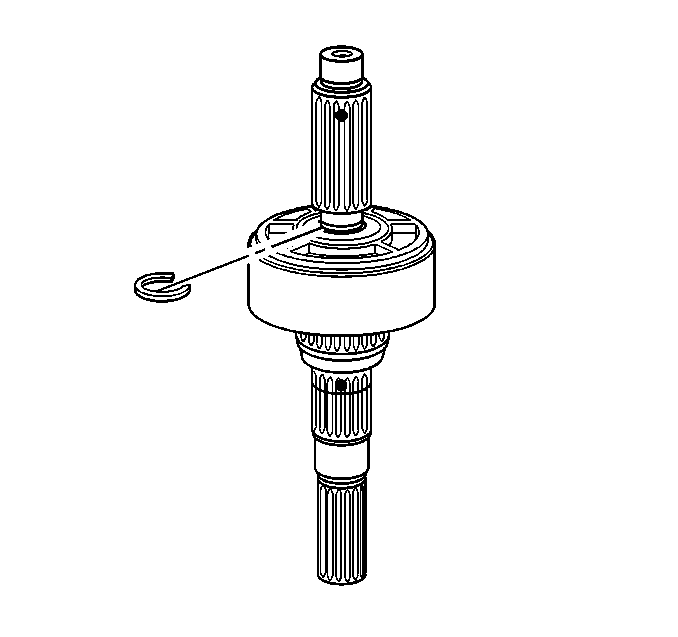
- Install the clutch apply plate retaining ring. Push down on the apply plate to access the retaining ring groove.
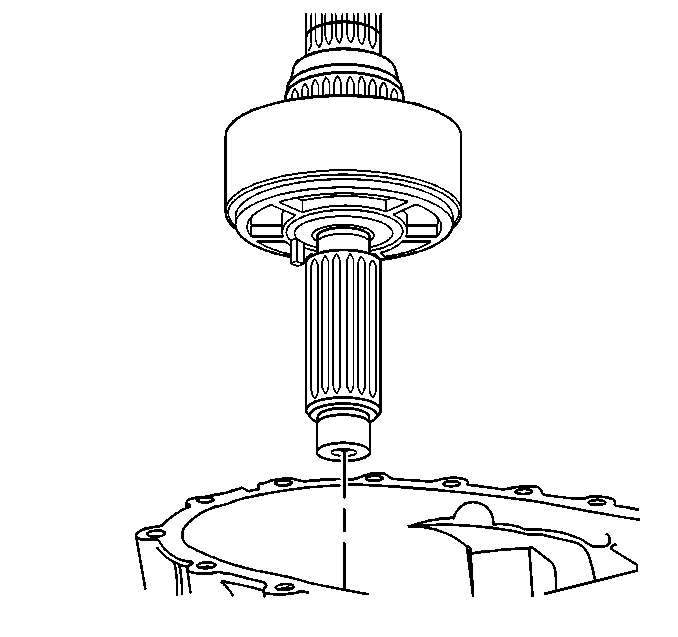
- Align the tab on the clutch inner support bearing hub with the clutch lever.
- Align the rear output shaft teeth to the planetary carrier and range sleeve teeth.
- Install the rear output shaft assembly.
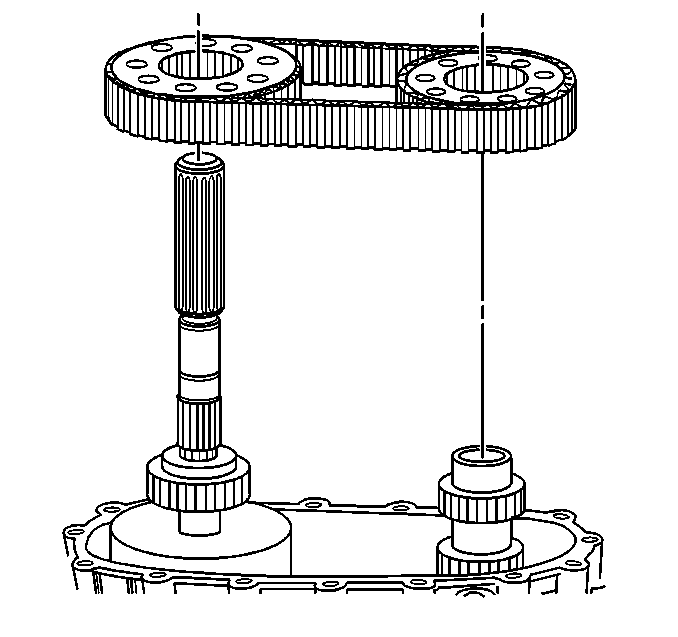
Important: Ensure to align the marks of the drive chain and sprockets if using the chain and sprockets again.
- Install the drive chain and sprockets. The blue chain links must face up or toward the rear of the vehicle.
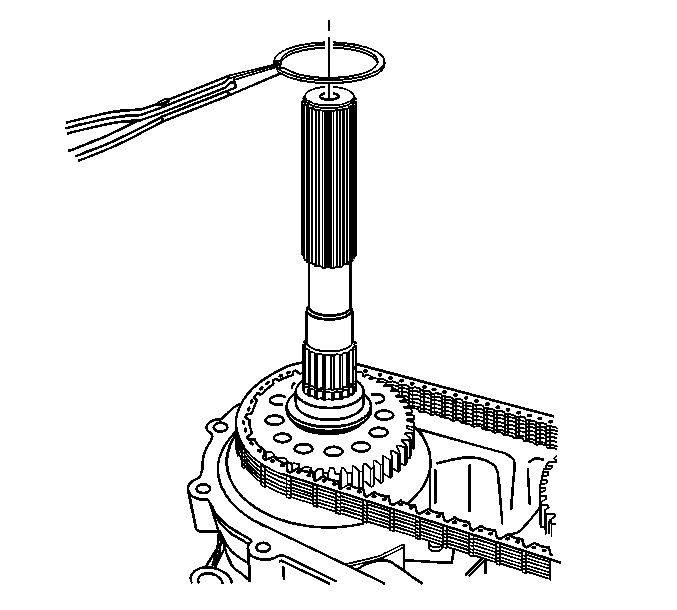
- Install the drive sprocket retaining ring.
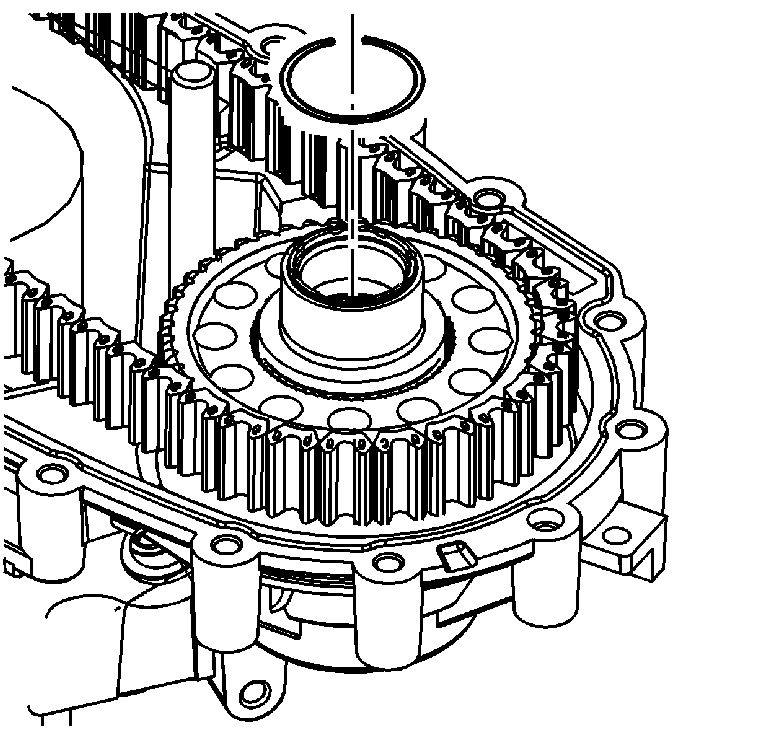
- Install the driven sprocket retaining ring.
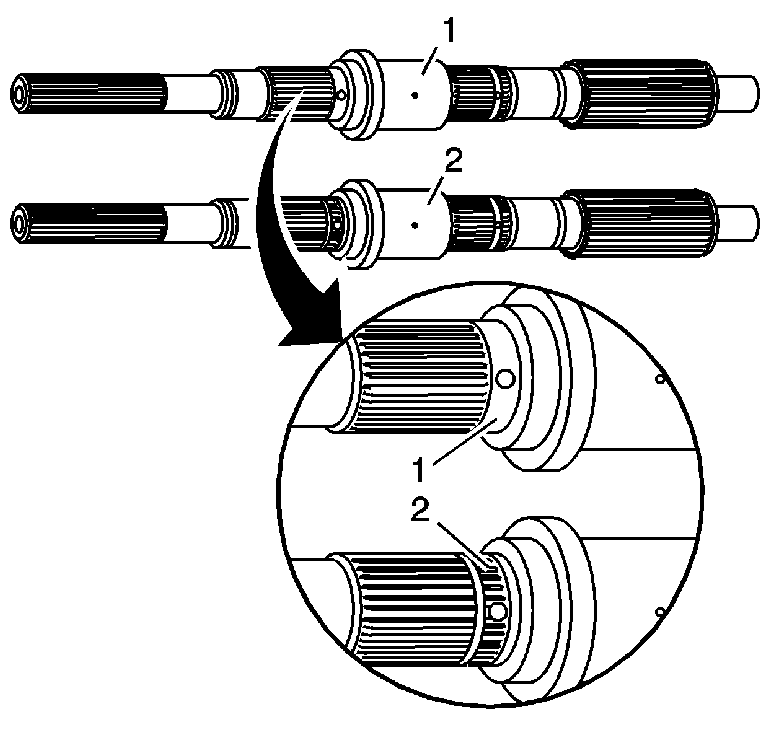
Important: The rear output shaft may be an original design (2) or the replacement design (1). The original design rear output shaft (2) uses an oil pump wave washer above the oil pump and a retaining ring under
the oil pump. The original design rear output shaft (2) is identified by the splines in the area by the oil gallery hole. The replacement design rear output shaft has a smooth area by the oil gallery hole. Ensure to follow the steps for the correct rear
output shaft.
- Inspect the rear output shaft to identify as an original design (2) or the replacement design (1).
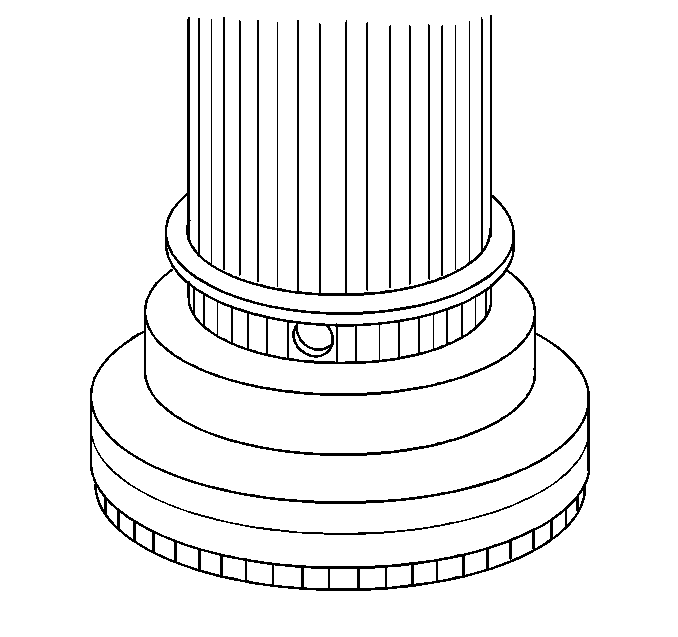
- If an original design rear output shaft, install the oil pump retaining ring onto the rear output shaft. Ensure
the retaining ring is not positioned over the oil hole on the rear output shaft.
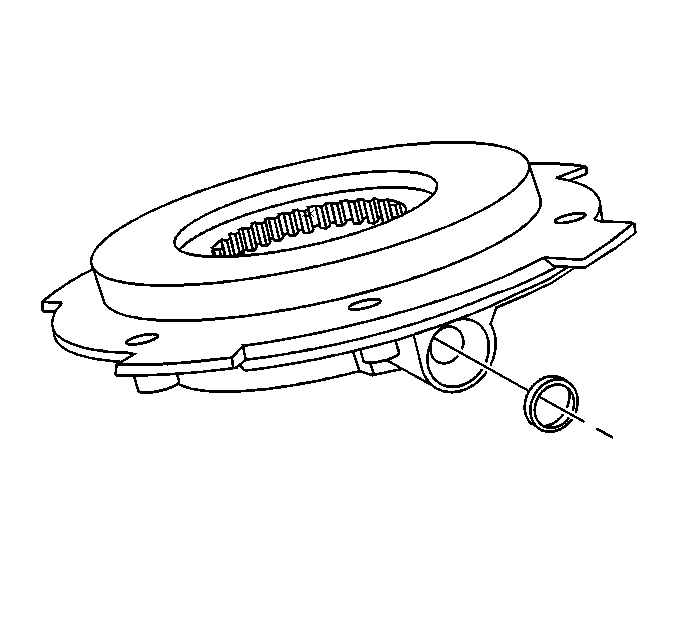
- Install a new oil pump suction pipe O-ring in the oil pump.
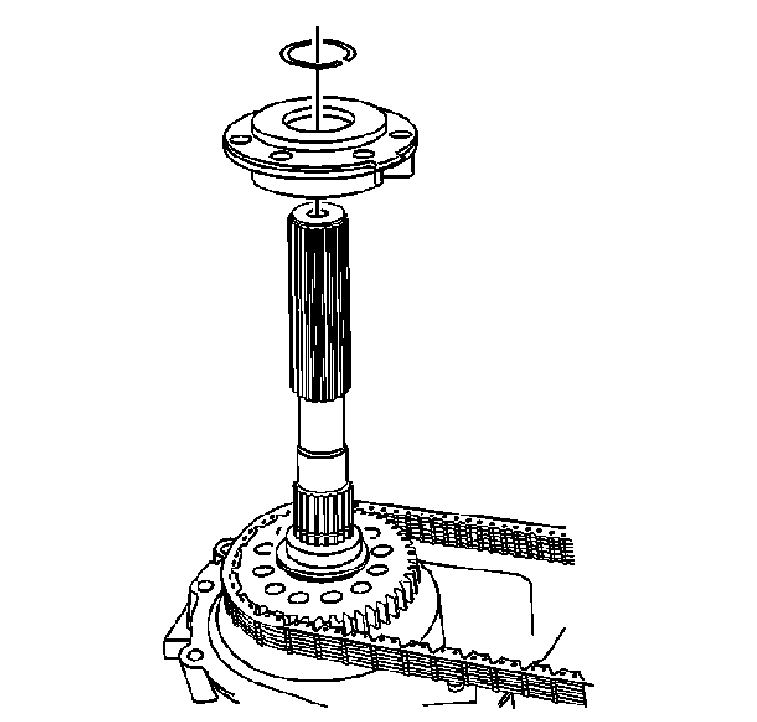
- Install the oil pump assembly.
- If an original design rear output shaft, install the oil pump wave washer.
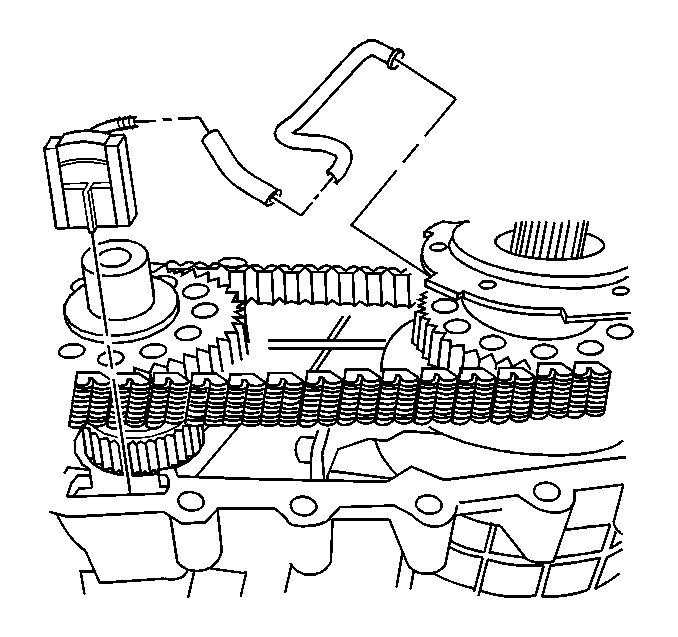
- Install the oil pump screen.
- Install the connector on the oil pump screen.
- Install the oil pump suction pipe to the oil pump.
- Connect the oil pump suction pipe to the connector.
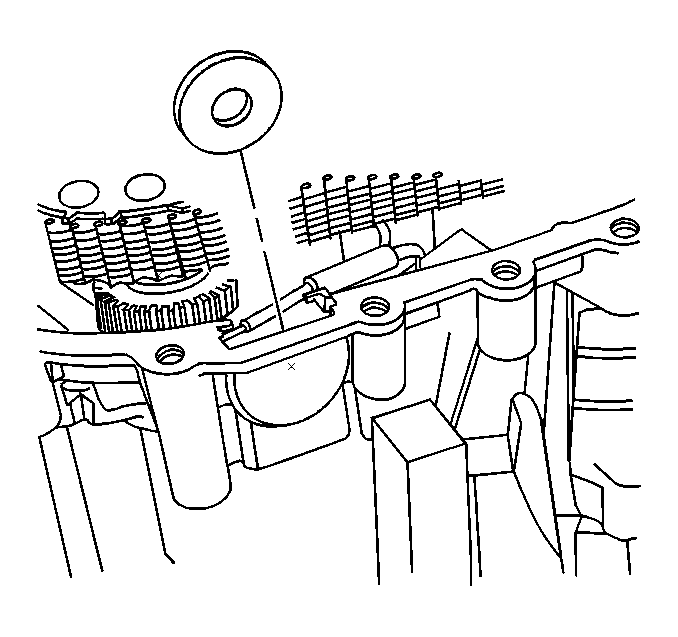
- Install the transfer case magnet.
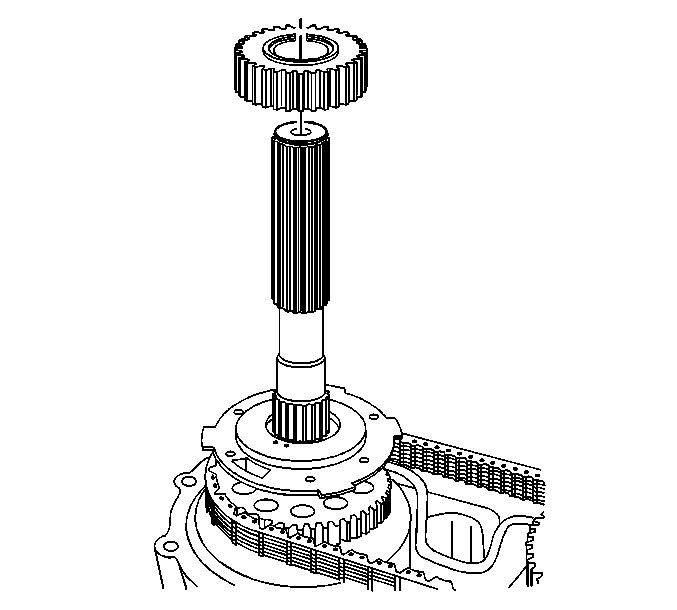
- Install the rear output shaft speed reluctor wheel.
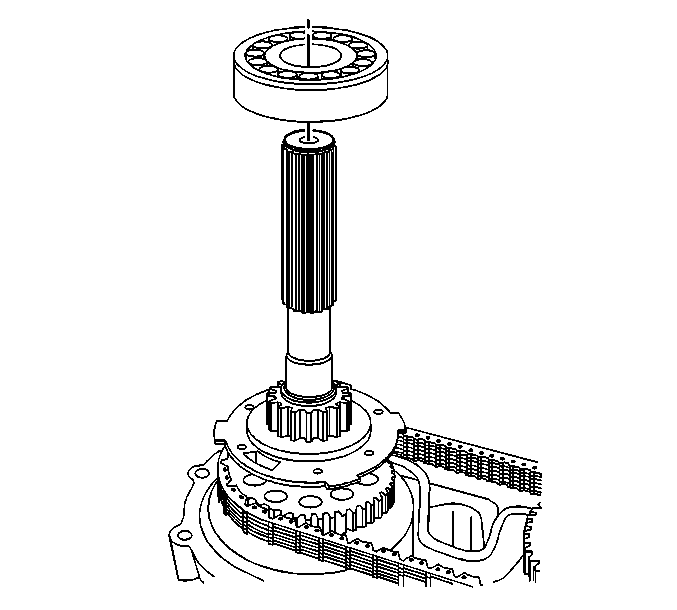
Important: Install the rear output shaft bearing with the groove for the retaining ring facing up.
- Install the rear output shaft bearing.
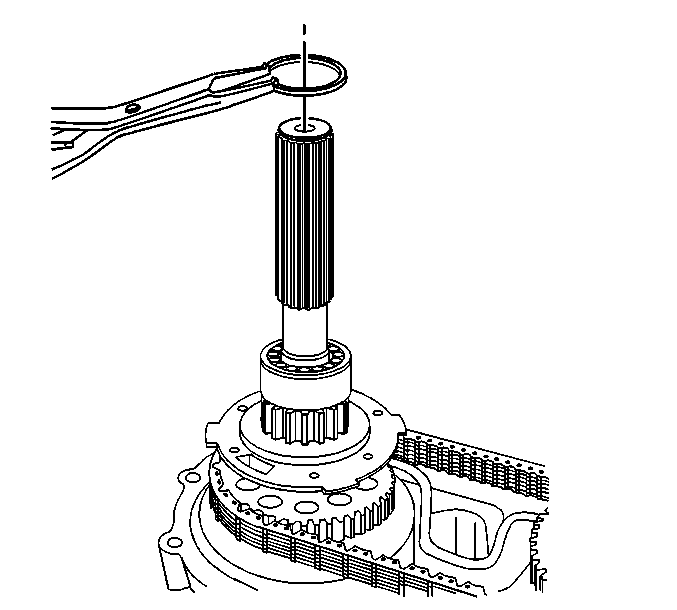
- Install the rear output shaft bearing retaining ring. Push down on the rear output shaft bearing to compress
the oil pump wave spring.
- Align the outside retaining ring for the rear output shaft bearing so that it is easily accessed through the opening in the rear case half.
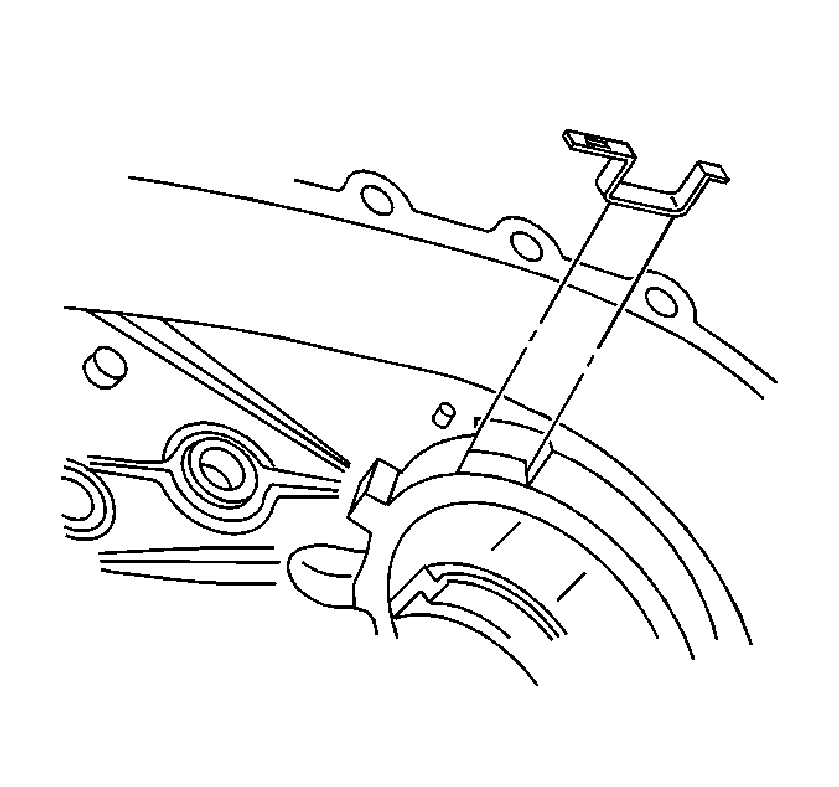
- Remove the 1st design oil pump wear sleeve from the rear case half.
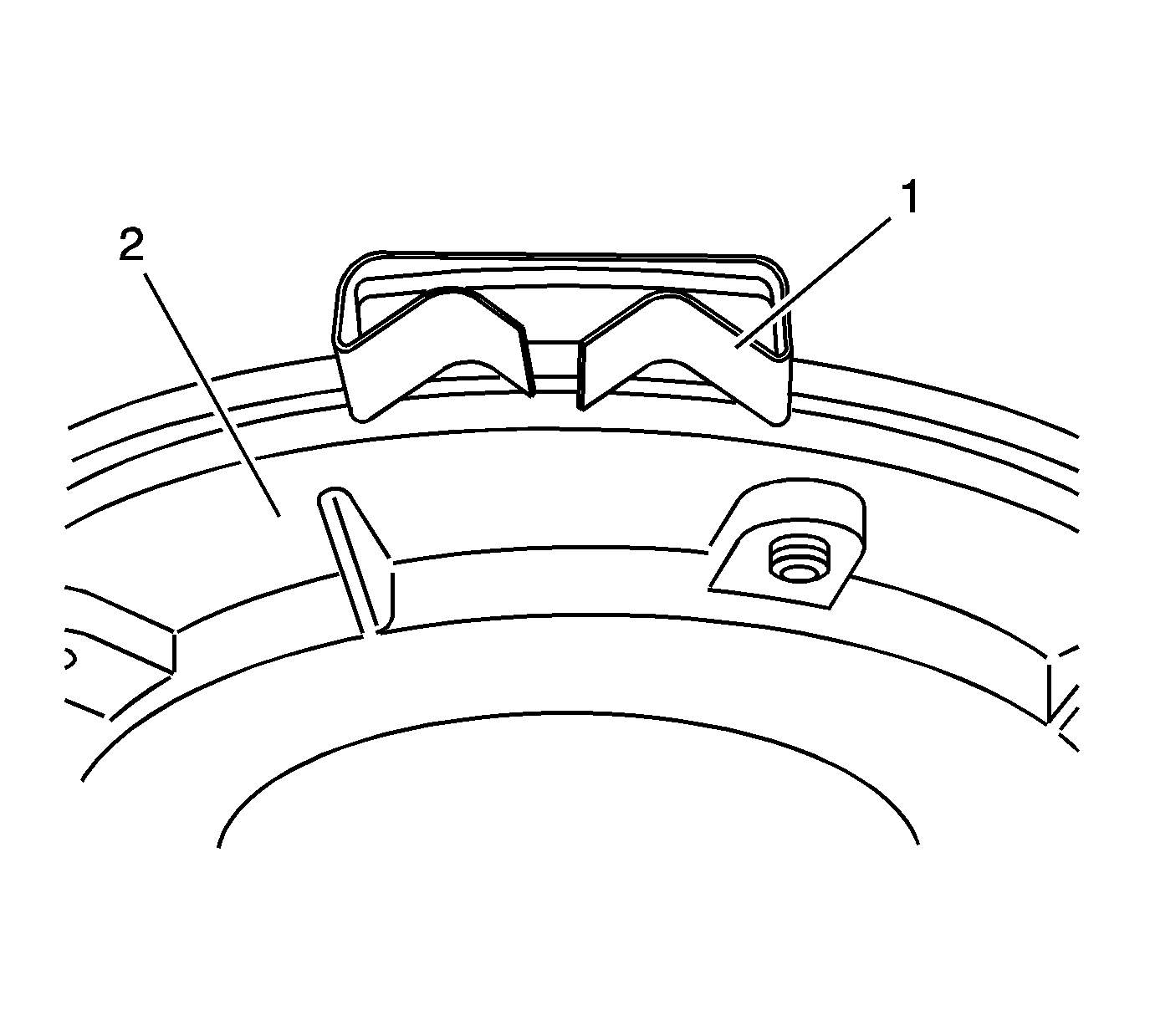
Important: Ensure the oil pump wear sleeve is properly positioned to the largest lug of the oil pump.
- Install the 2nd design oil pump wear sleeve (1) to the oil pump (2).
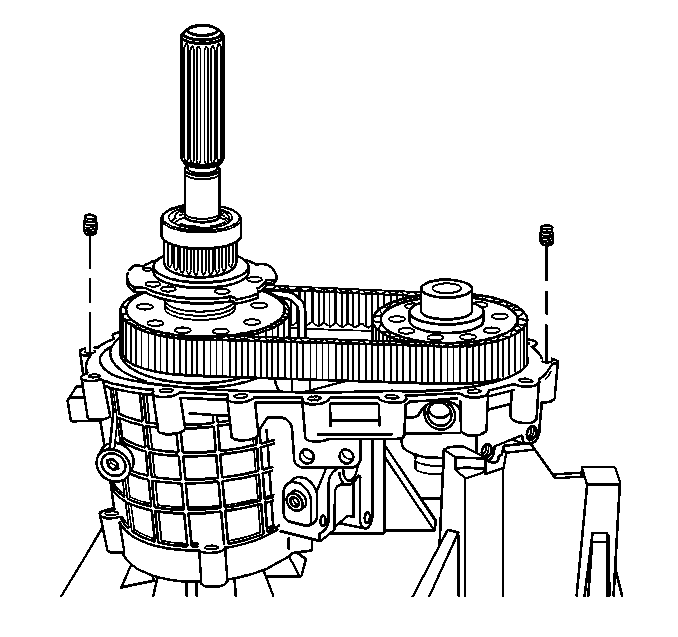
Important:
| • | Ensure that both the sealing surfaces on the front and rear case halves are free of dirt, oil, and cleaning solvent. |
| • | Ensure the locating pins are installed in the front case half. |
- Install the locating pins in the front case, if necessary.
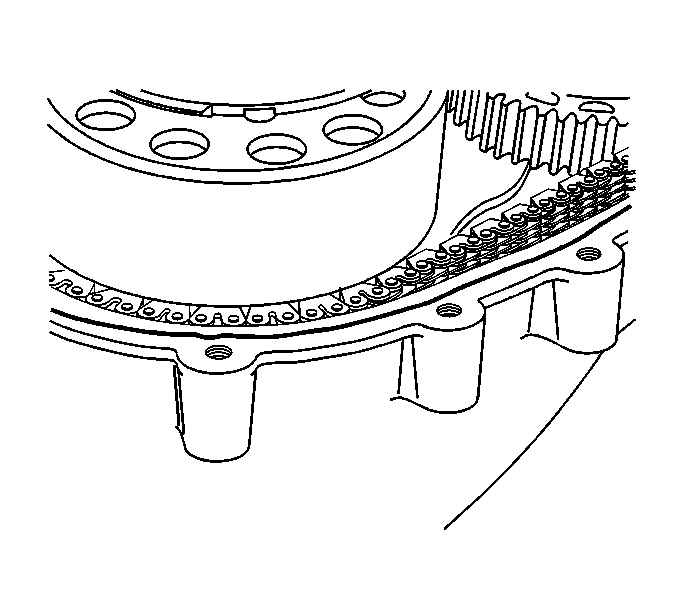
- Apply a 3.175 mm (1/8 in) bead of RTV sealant GM P/N 12345739 (Canadian P/N 10953541)
or equivalent to the mating surfaces of the front case half.
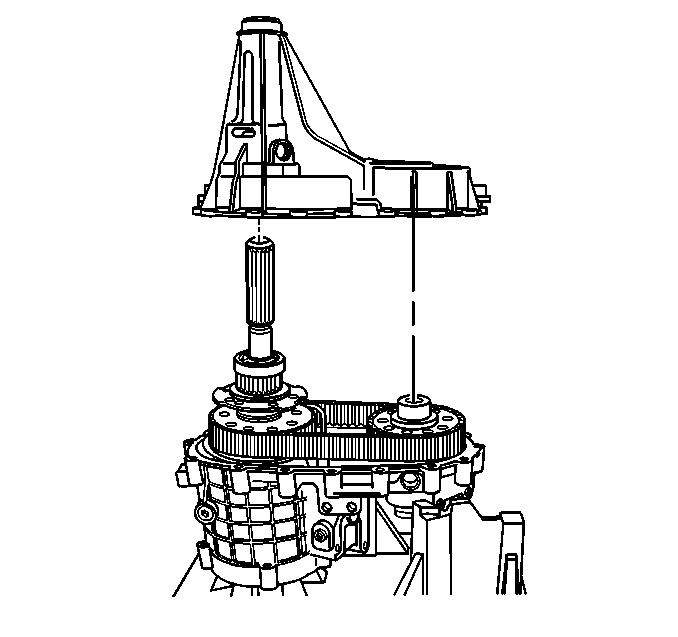
- Lower the rear case half in to place.
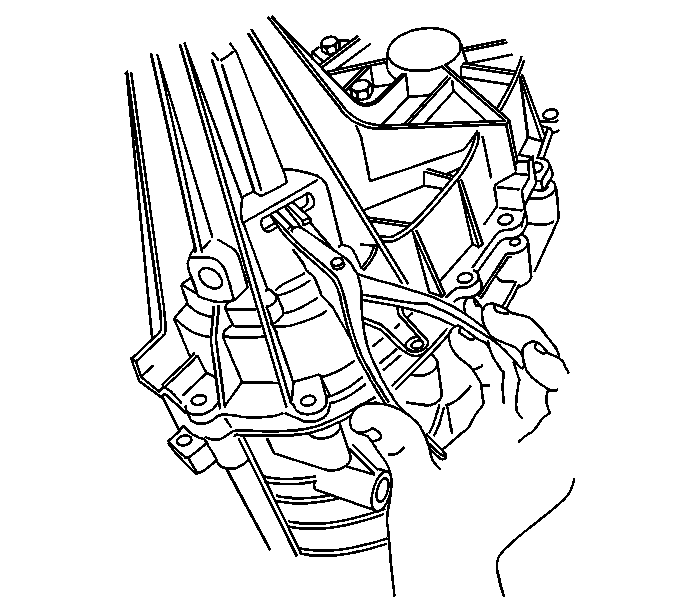
- Using a pair of snap ring pliers, open the retaining ring for the rear output shaft bearing.
- Insert a rubber coated screwdriver into one of the speed sensor holes and lift up on the speed reluctor wheel, then seat the retaining ring.
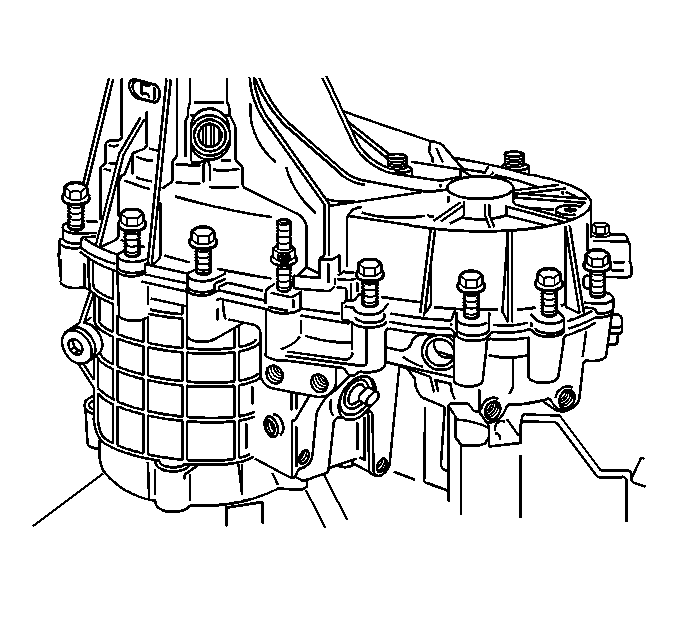
Notice: This component is made of magnesium. Proper assembly is required to
prevent damage. Ensure the magnesium transfer case housings are properly
insulated from all external steel components, or galvanic corrosion will occur.
New nylon coated case bolts and aluminum washers must be used. Use only aluminum
fill and drain plugs. Use only aluminum brackets under the case bolts. Ensure
new seals are installed that have a rubber insulated outside diameter and
have no tears or cuts. Extensive damage will occur if there is galvanic corrosion
between the magnesium and steel components.
- Install the new case bolts, washers, and brackets.
Tighten
Tighten the case bolts to 37 N·m (27 lb ft).
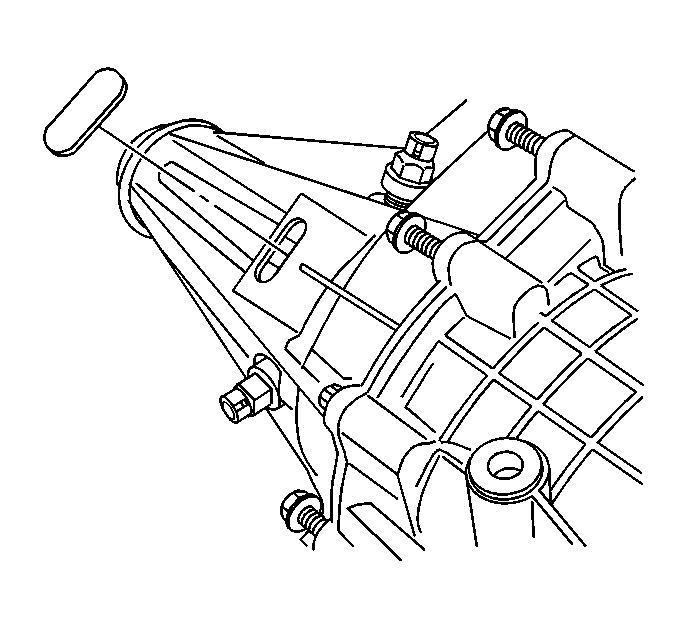
- Install the access hole plug.
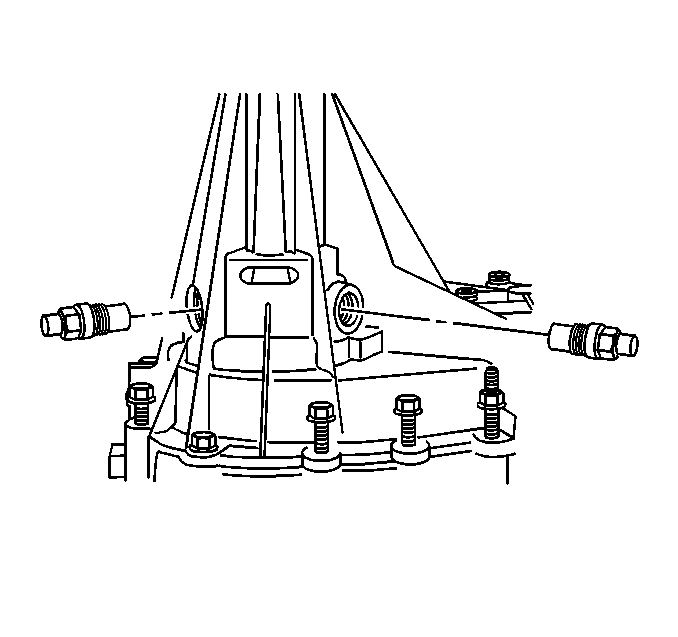
- Install new O-ring seals on the vehicle speed sensors.
- Lubricate the vehicle speed sensor O-ring seals with transfer case fluid.
- Install the rear vehicle speed sensors.
Tighten
Tighten the speed senor to 15 N·m (11 lb ft).
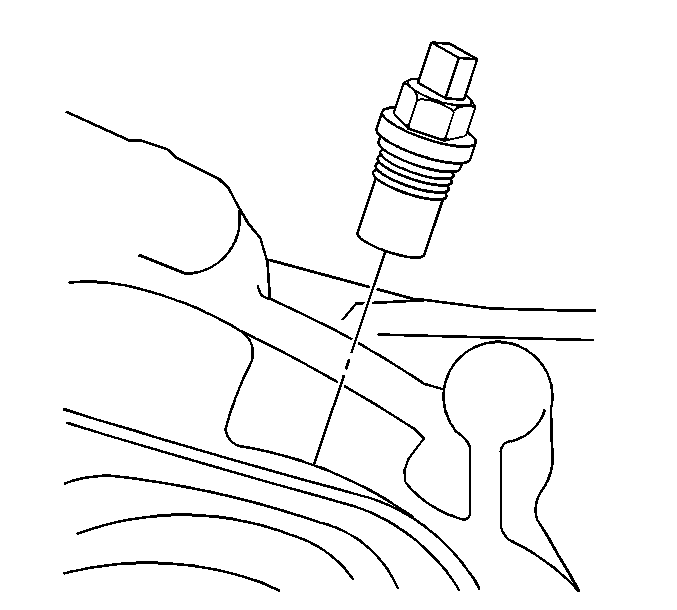
- Install the front vehicle speed sensor.
Tighten
Tighten the speed senor to 15 N·m (11 lb ft).
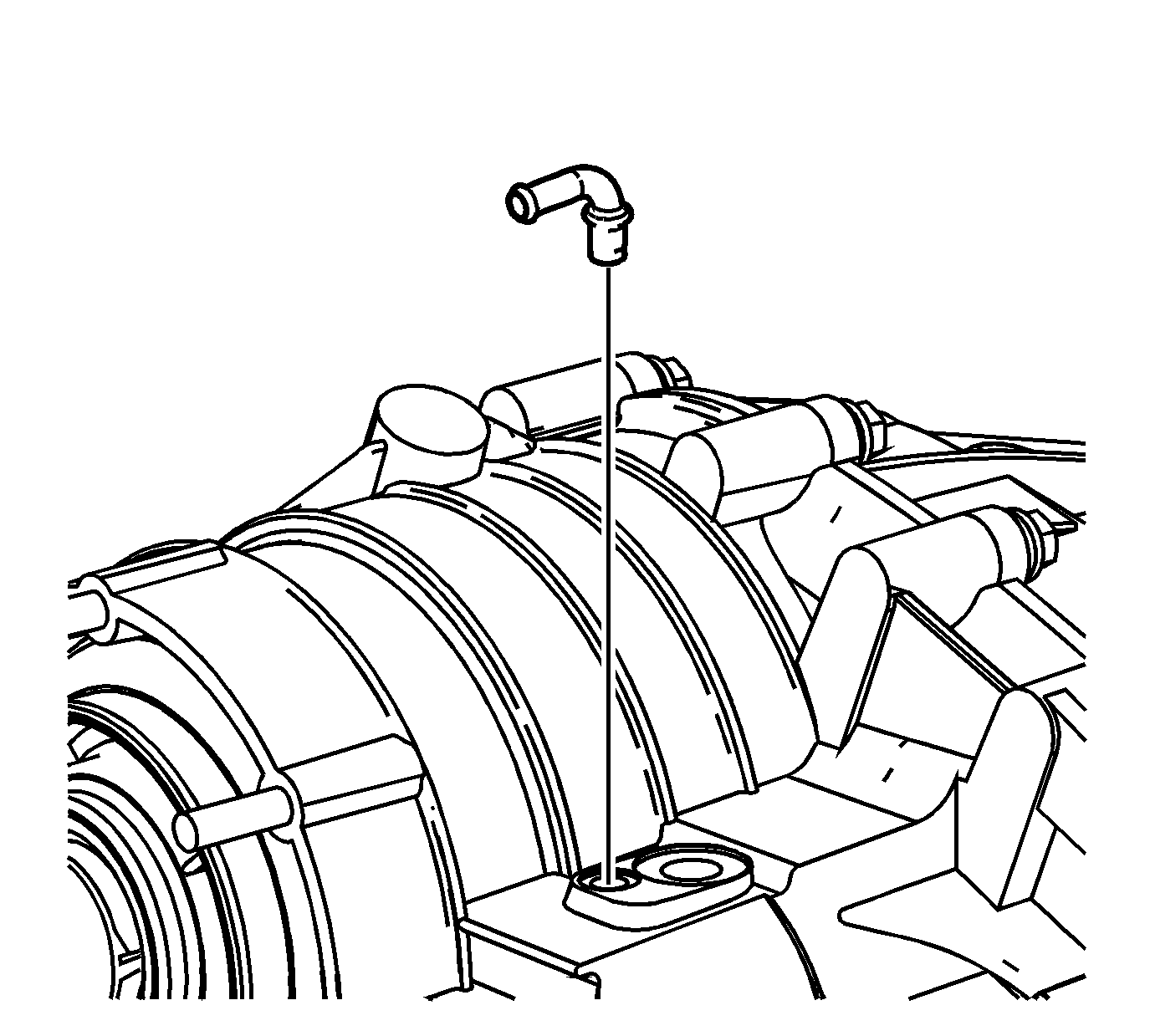
- Apply a thin layer of retaining compound GM P/N 12377901, Canadian P/N 10953504,
or equivalent, to the NEW aluminum vent pipe.
- Tap the NEW aluminum vent pipe into the case; ensure the vent pipe is aligned in the direction shown.
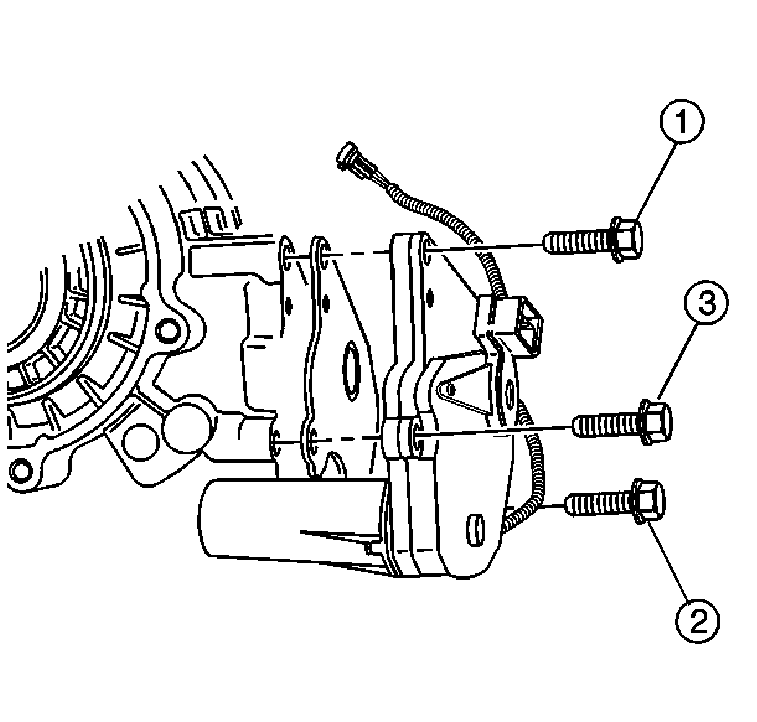
- Install the actuator insulator to the transfer case.
- Install the encoder motor to the transfer case. Rotate the control actuator lever shaft to align to the encoder motor.
- Install the mounting bolts for the encoder motor.
Tighten
Tighten the encoder motor mounting bolts, in the sequence shown, to 20 N·m (15 lb ft).
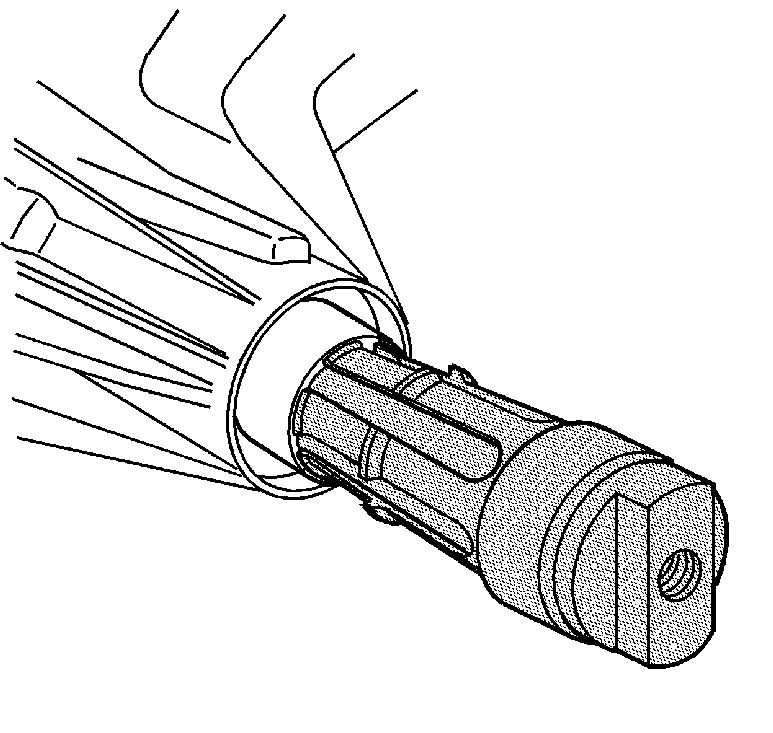
- Using the
J 45380
, install a new rear output shaft bushing.
| 108.1. | Install the bushing on the finger section of the
J 45380
. |
| 108.2. | Install the finger section to the main body of the
J 45380
. |
| 108.3. | Position the bushing and tool to the case. |
| 108.4. | Using a hammer and the
J 45380
, install the bushing. |
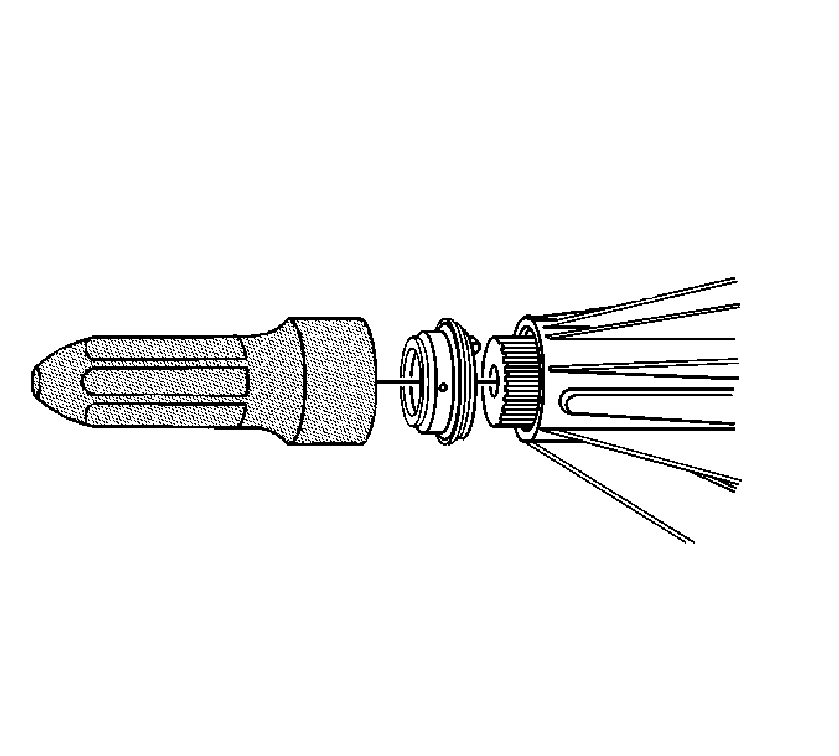
- Align the rear output shaft seal to the rear case, with the square tab up and the drain hole down.
Important: When installing the rear output shaft seal, ensure that the drain hole is pointed down at an angle at which the transfer case would be installed in the vehicle.
- Using the
J 37668-A
, install the rear output shaft seal.
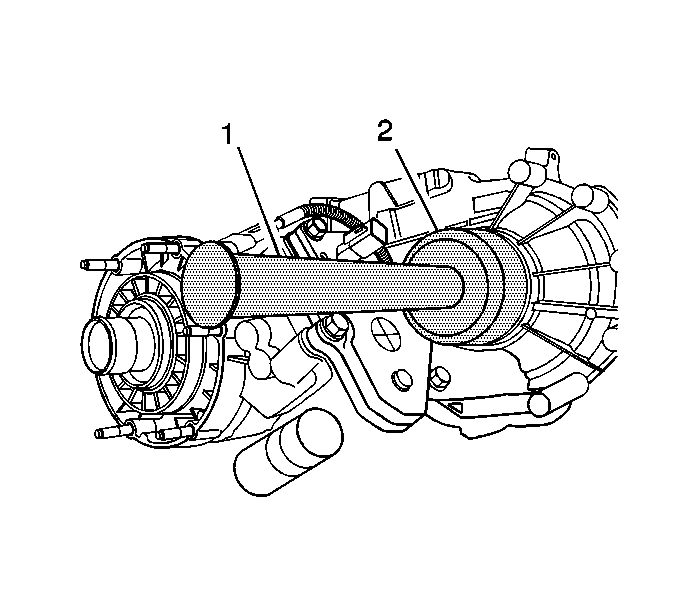
- Using the
J 43484
(2) and the
J 8092
(1), install the front output shaft seal.
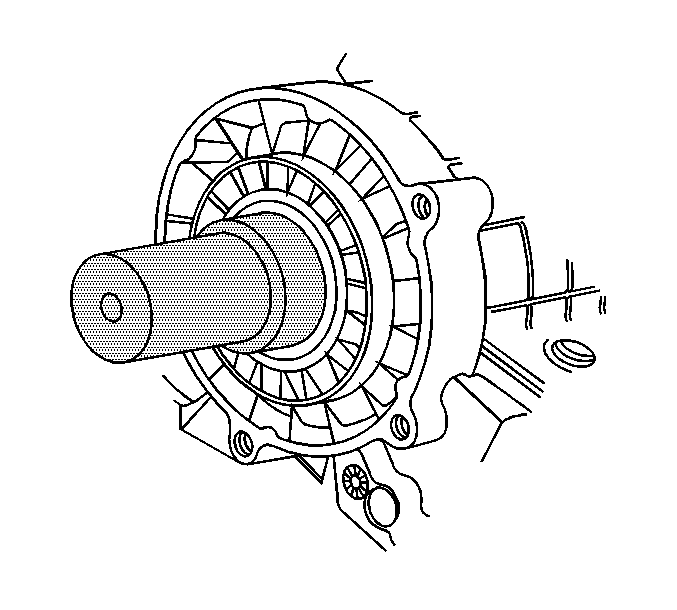
- Using the
J 42738
, install the input shaft seal.





































































